Volunteering to save lives





Scottish Mountain Rescue (SMR) represents 26 Mountain Rescue Teams (MRTs) made up of highly trained volunteers. Scottish Mountain Rescue and our Member Teams are all charities in their own right. We also represent four Police Scotland MRTs and one RAF MRT.
Our 850 volunteers respond in a moment’s notice, 24 hours a day, 365 days a year to assist people in the outdoors. They give up their time, their beds, abandon their work and are often called away from their families to assist total strangers.
Together we are here to save lives in the outdoors in Scotland.
www.scottishmountainrescue.org
Scottish Mountain Rescue is a registered charity No. SC045003.
“Both the experience of being rescued myself and the fact that my dad volunteers with Moffat Mountain Rescue means I really appreciate the willingness of the many volunteers that make up Scottish Mountain Rescue to drop what they’re doing and respond to a call out. I felt I wanted to give back.”
Jake Finney, broke his back in a climbing accident, was rescued by Lomond Mountain Rescue Team and went on to become the youngest person to walk the watershed of Scotland in 2024. This is a challenging 1,100 mile trek with 64,000m of ascent along the spine of Scotland to raise funds for Scottish Mountain Rescue.
636 Total number of incidents in 2024.
An incident is defined as a single event that requires the services of an MRT. An incident might involve call-outs of more than one team.
2023: 572
2022: 636
335 (53%) were mountaineering* related, 301 (47%) were non-mountaineering incidents.
*Mountaineering includes hill-walking, scrambling, rock climbing, winter climbing, and MRT activity.
The total number of separate team call-outs was 943, or 1,000 including ‘continuations’ (linked call-outs on different days).
2023: 976
2022: 906
This is an average 2.7 per day (including continuations). At least one team was called out on 287 days this year, and on the busiest day (Saturday 7th September) teams were called out 19 times.
In 2024 Mountain Rescue volunteers and Police Scotland team members gave up 29,986 hours of their time during callouts.
2023: 32,762
2022: 29,804
24,202 hours were dedicated by our volunteer teams alone. That’s the equivalent of fourteen people working 40 hour weeks for a year covering just the call-out time… Voluntarily!
During 2024 740 people were rescued.
2023: 677
2022: 740
4 incidents involved rescue of sheep, and 13 incidents involved the rescue of dogs.
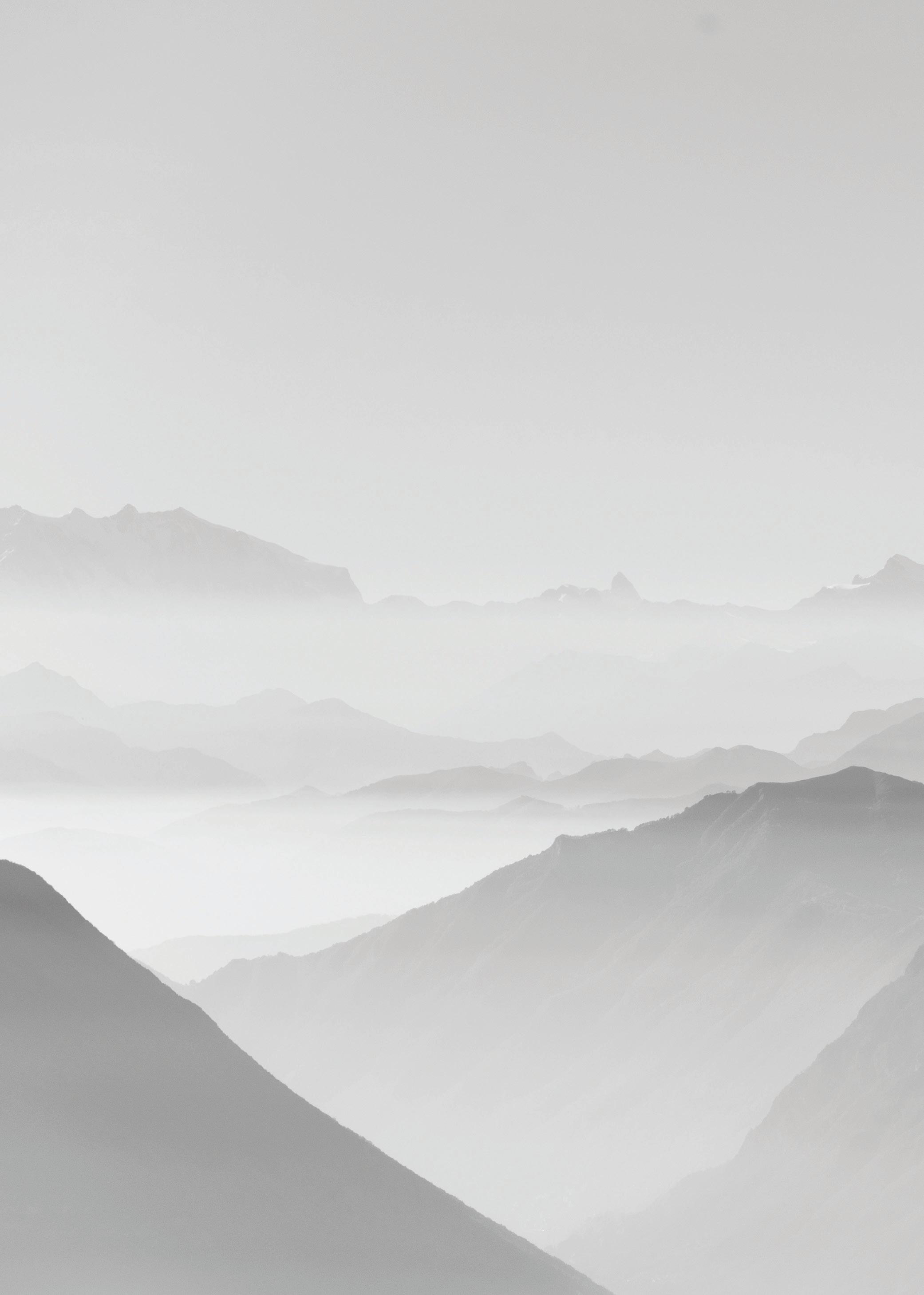


636
Total number of independent incidents.
335
Incidents related to mountaineering.
301
Incidents not related to mountaineering.
29,986
Hours of time given up by team members.
1,000
Total number of team callouts.
740
People were rescued.
17


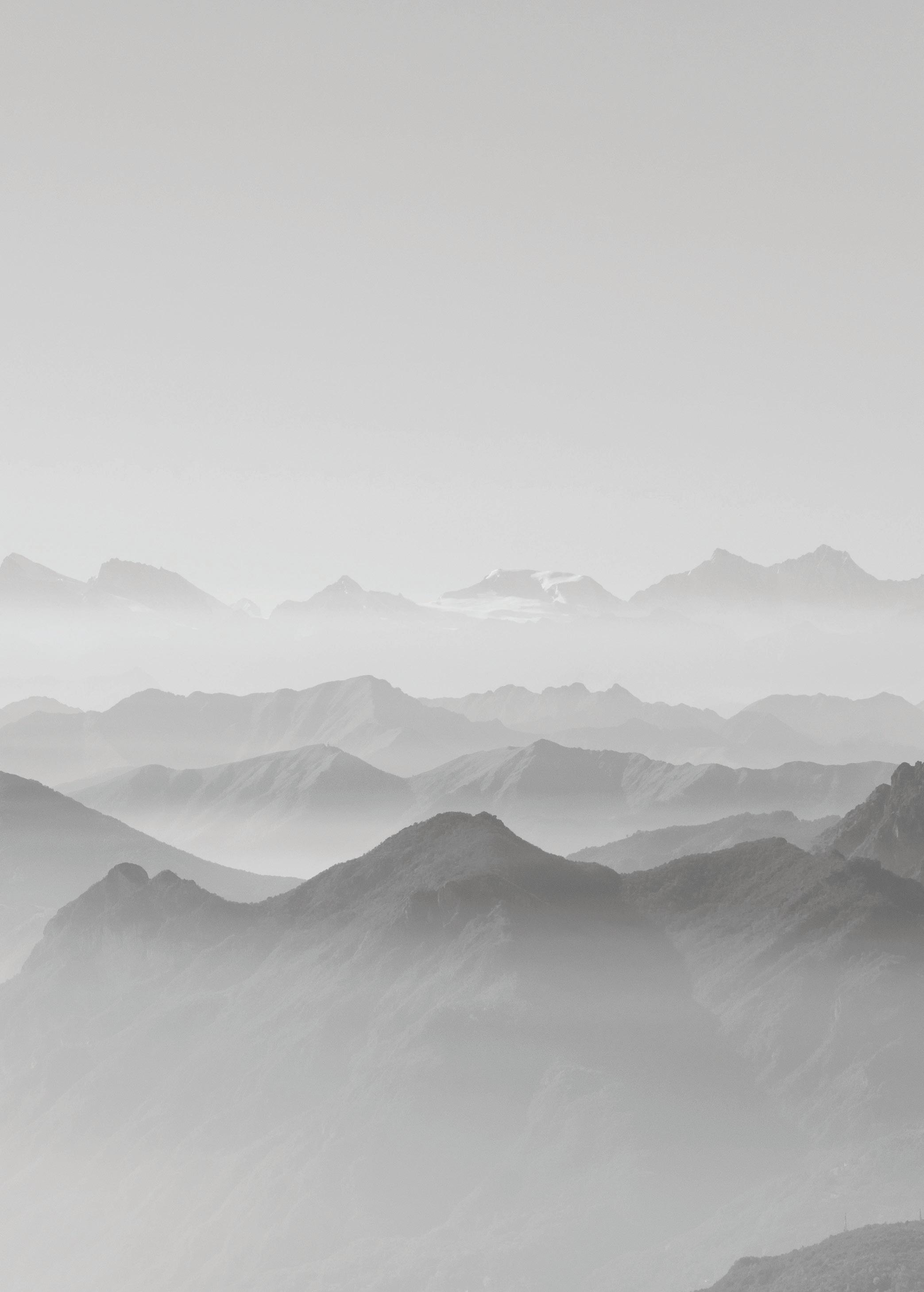
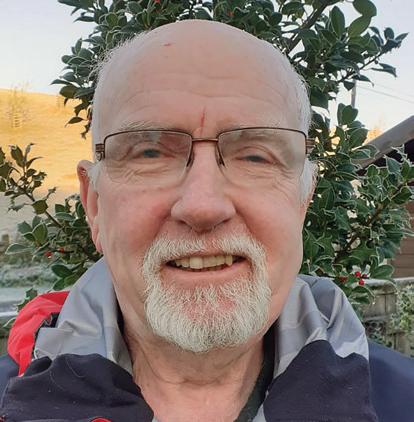
Bill Glennie, Scottish Mountain Rescue Chair
It’s been another busy and demanding year for both Scottish Mountain Rescue and our 26 member teams. As our statistics from 2024 show, the increase in people needing the assistance of a mountain rescue team grew significantly post pandemic and has remained high ever since.
Our 850 volunteers respond in a moment’s notice whenever they are needed. In recent years, with a growing number of call-outs for teams, that has also meant an increased time commitment for our volunteers.
“Team members respond to a wide range of emergencies from people stuck in caves, to disoriented walkers and crag-fast climbers. They can be called out at any time of day and in any weather.”
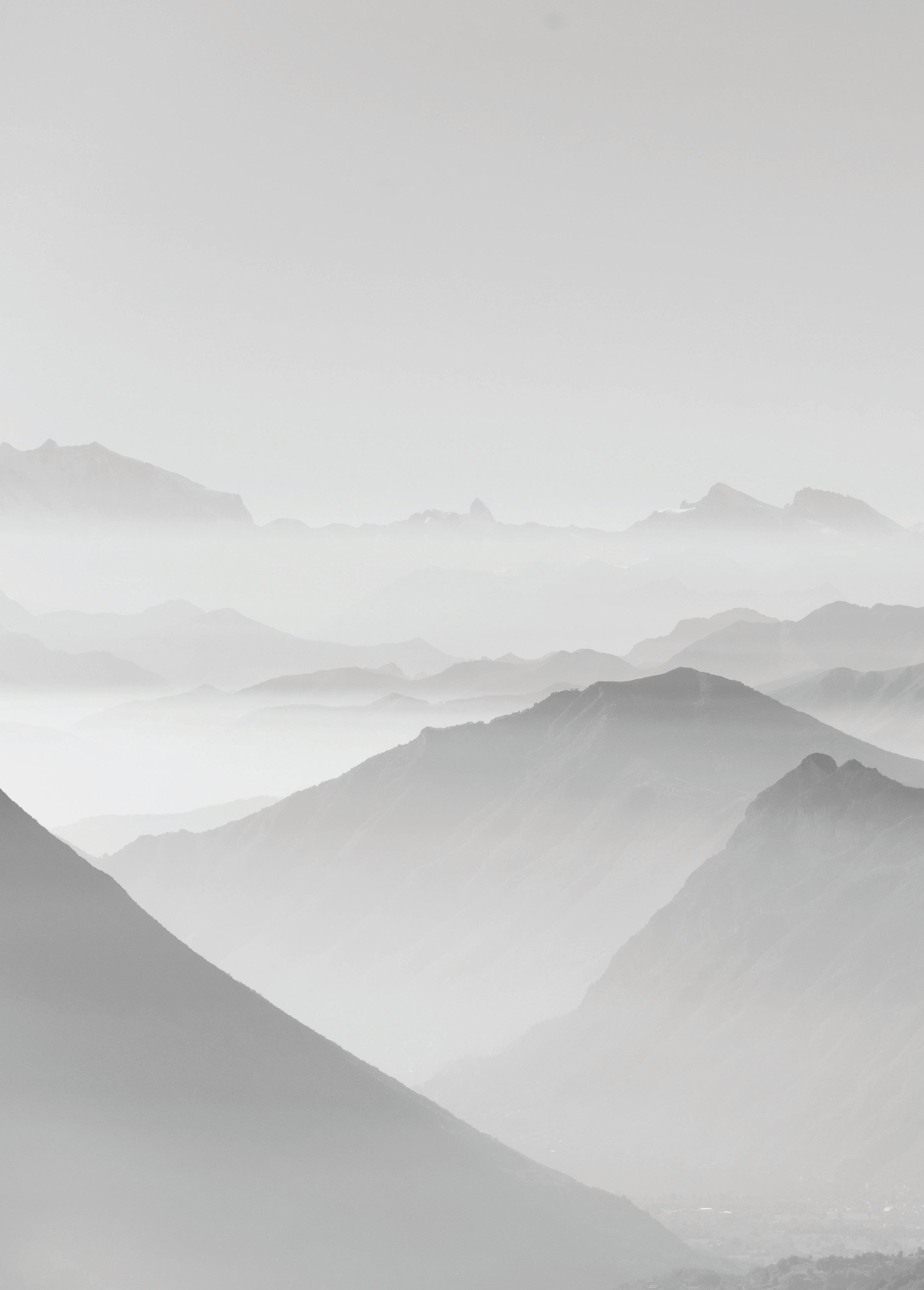
Balancing all this, as a volunteer alongside full-time work and family commitments requires enormous resilience.
“Rescues
often by their very nature take place in challenging environments. Volunteers can be called to remote, dangerous and inaccessible locations, potentially during the hours of darkness and with the fastchanging weather in our mountains, conditions can be unpredictable.”
Our volunteers train for these environments and scenarios but it’s still important that we support their resilience and wellbeing.
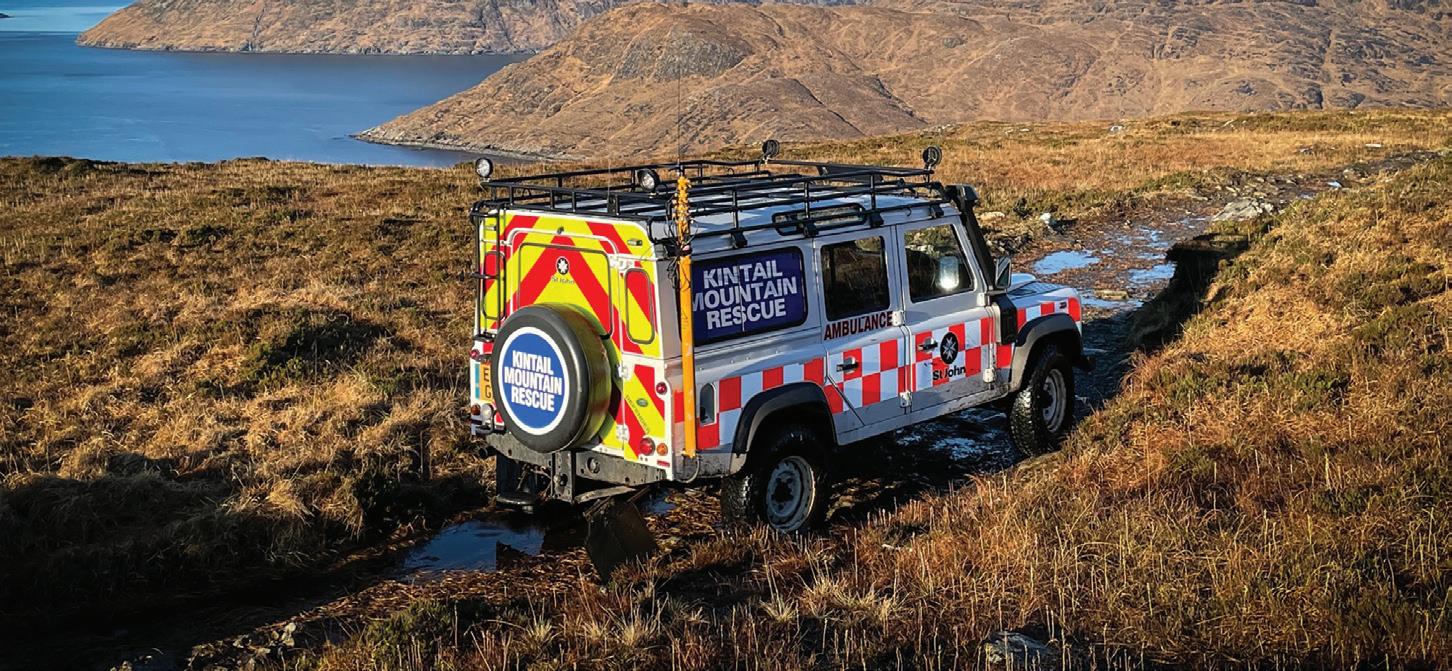
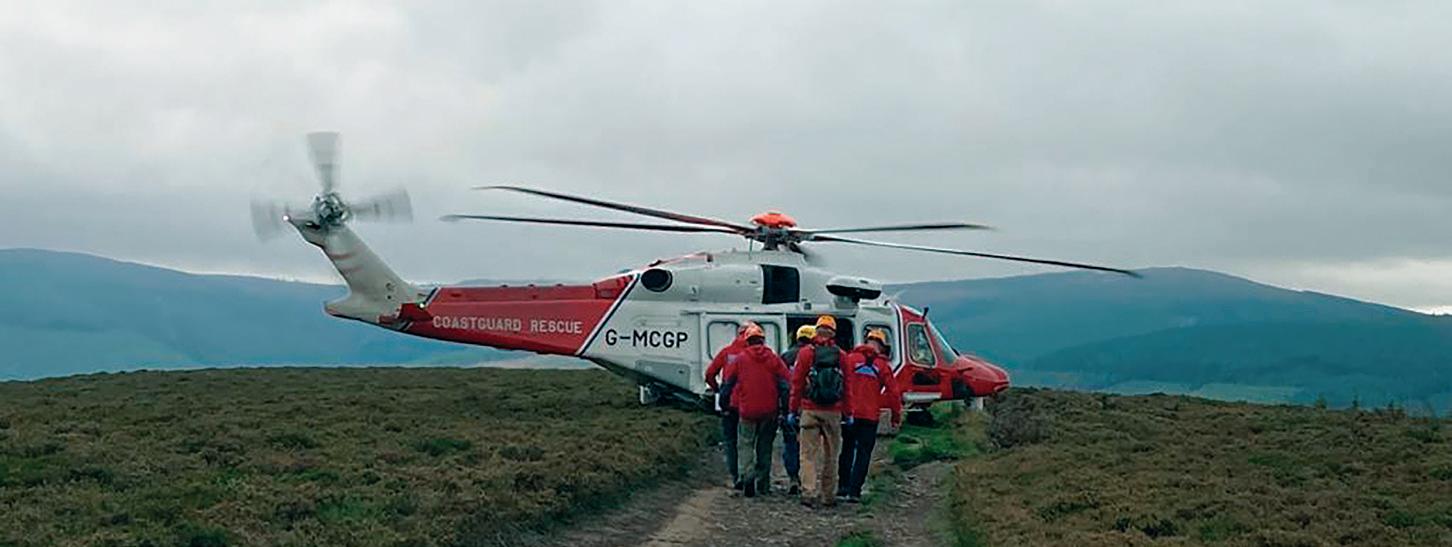
We are grateful to the families of our volunteers for their flexibility in supporting their family member to volunteer in a team. This often means big sacrifices on the part of the families who miss out on so much in order that their family member can attend call-outs and training, with call-outs meaning that the volunteers and their families can be required to drop everything at a moment’s notice.
“The demands upon our 26 member teams and Scottish Mountain Rescue have increased too, recent years have brought increased regulatory and financial pressures, with the loss of some funding, increased costs and a difficult economic climate.”
These pressures have been felt both by our member teams and by Scottish Mountain Rescue as we endeavour to support our member teams. We’ve needed to be adaptable and resilient to navigate these challenges and to continue to work together with our member teams to equip and train our volunteers. We’ve benefited from improved knowledge, equipment and
technology, which is undoubtedly keeping our volunteers safer, making our rescues more effective and increasing the chances of survival for a casualty in a life-threatening scenario, but this does bring additional financial challenges.
We are incredibly grateful for the continued kindness of our fundraisers and donors. Your support keeps us going through the tough times. Not only the vital financial support that we receive, but knowing that you are part of our team, and are there supporting us to do what we do. Many of our supporters have their own stories of resilience: whether that’s supporters like Jake, who overcame severe injury after a climbing accident and subsequent rescue and went on to achieve the incredible feat of being the youngest person to walk the watershed of Scotland; or our supporters taking part in their first 5k, or marathon; or completing their last Munro to raise vital funds for our teams.
We are all one team of lifesavers. Thank you for supporting us and helping us to be there for you. Together we can provide peace of mind for everyone who wants to enjoy our beautiful Scottish Mountains.
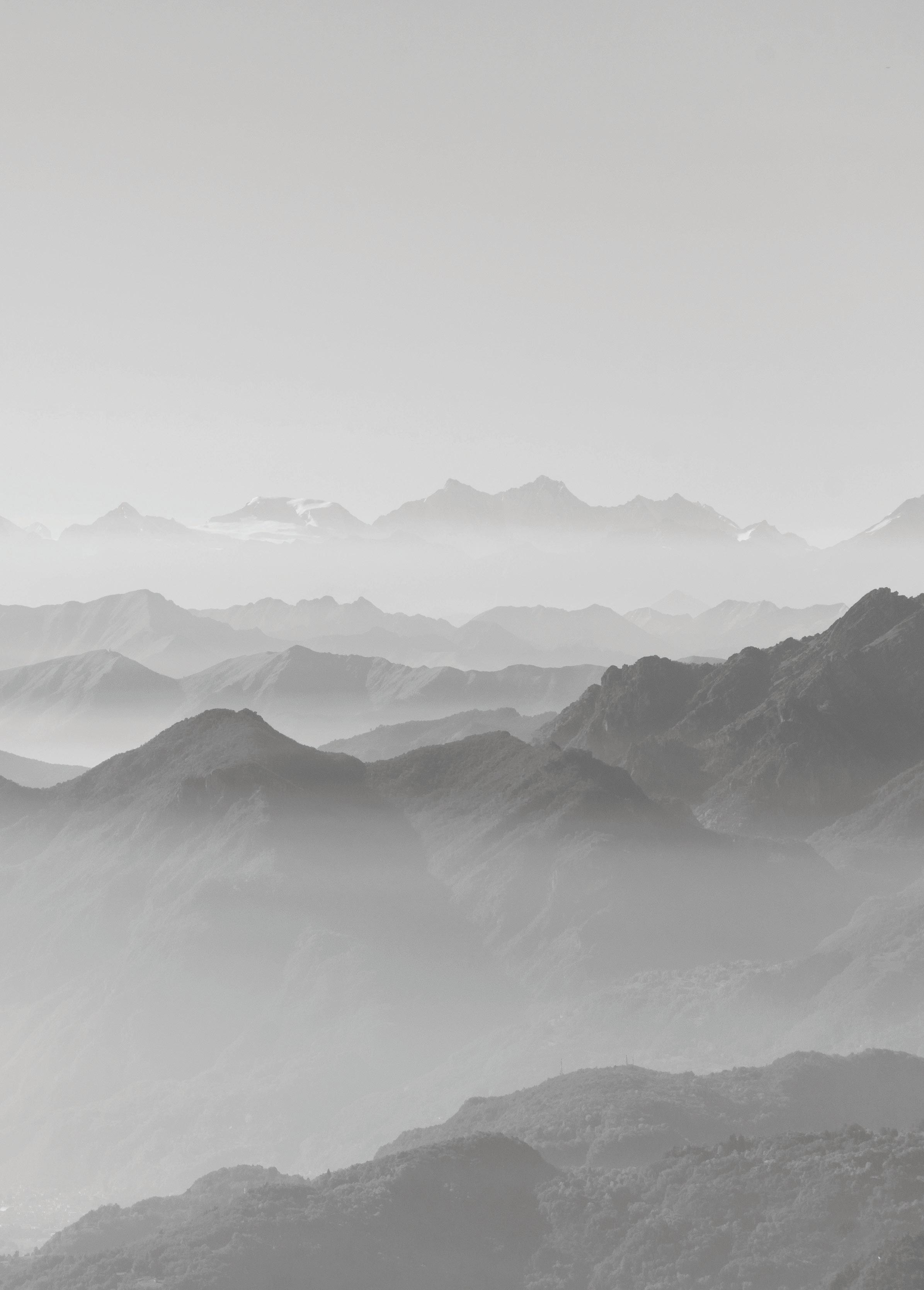
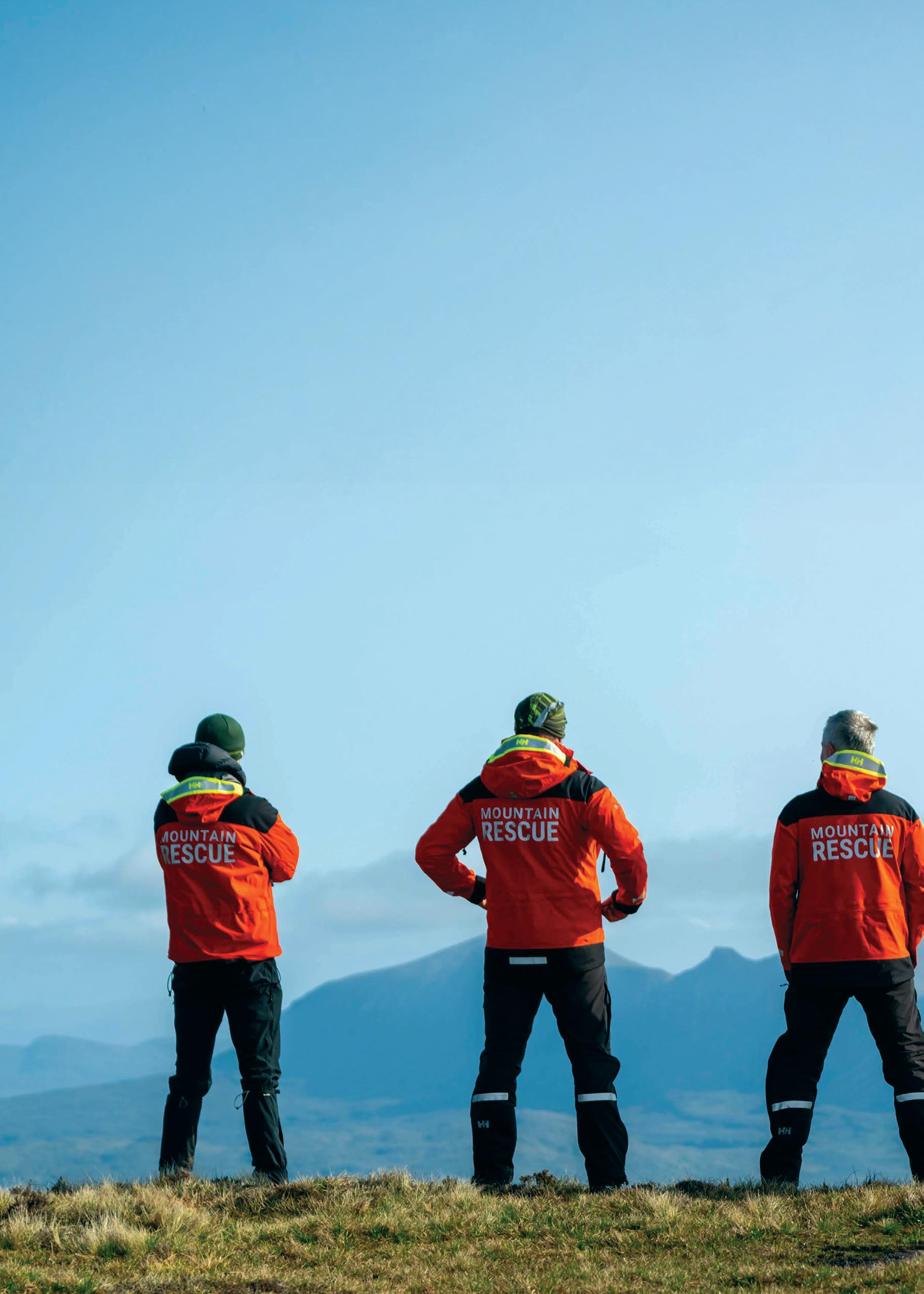
• To maintain the ability of Scottish Mountain Rescue affiliated teams to locate, assist and save the lives of people who are lost, injured, missing or otherwise in need of help in Scotland’s mountains and remote places.
• To offer a world class, front line, voluntary search and rescue service capable of responding, individually or collectively, any hour, any day and in any weather condition.
• To work with other emergency responder organisations to assist our local communities in times of emergency.
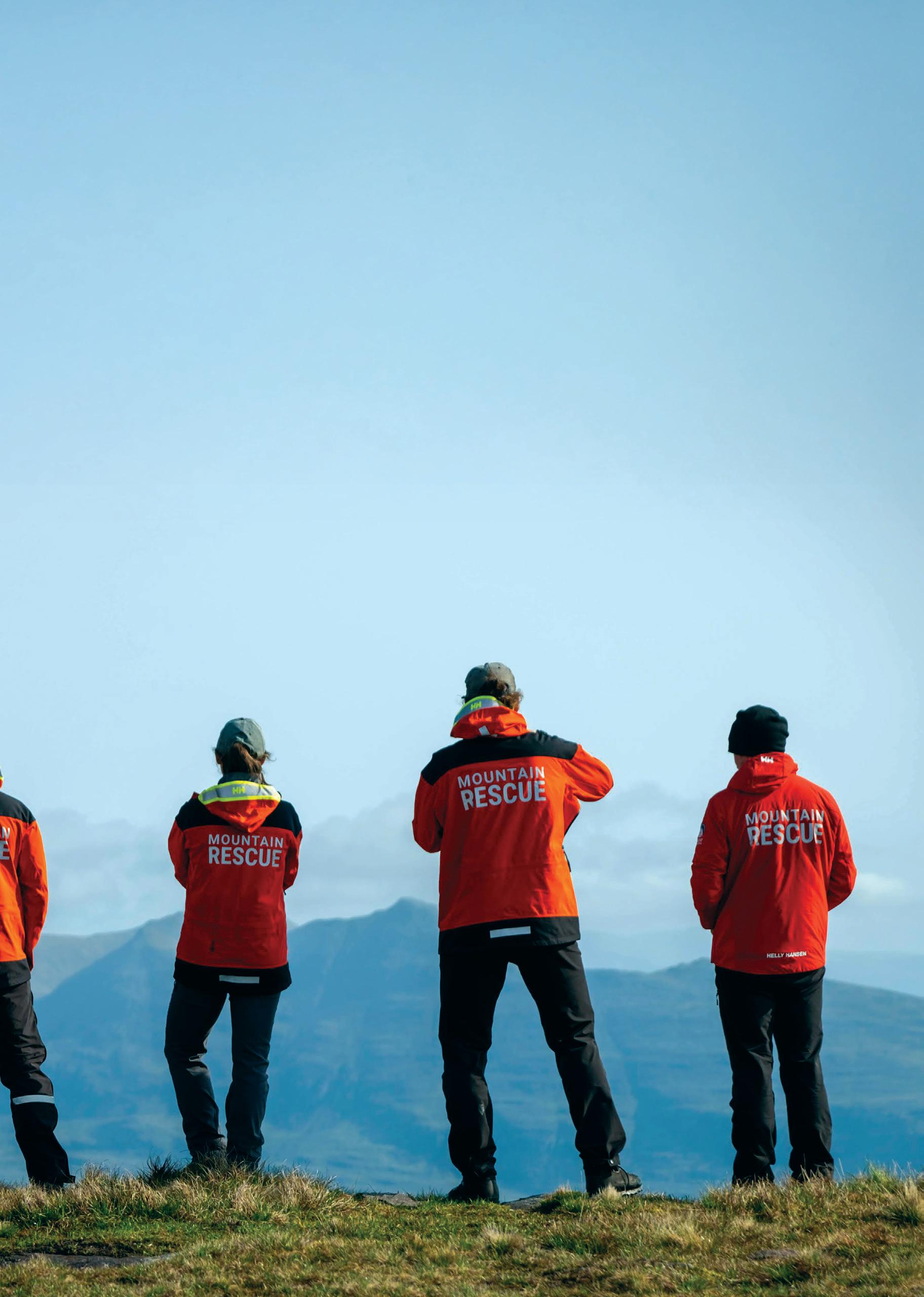
• Excellence – We strive to assist all of our members to achieve excellence in their search and rescue activities.
• Community – We strive to maintain a strong community of independent teams working collaboratively for the benefit of all.
• Engagement – We strive to engage positively with any person or organisation towards improving Search and Rescue capabilities in Scotland.
• Inclusivity – We endeavour to promote respect for all people equally, without bias, around differences of any kind.

Tayside MRT had a very busy start to the year, with 6 Call-outs within the first two weeks of January. One particularly busy Saturday saw 2 simultaneous shouts for the team to lower-leg injuries on different hills. Neighbouring Killin MRT provided assistance.
Scottish Woodlands began their partnership with us as their ‘charity of the year’. They went on to raise an amazing £4,000 through their creative challenges and events such as the Southern Upland Way team relay, crossing the country by foot, bike, and kayak.
Drone Pilots from Galloway Mountain Rescue Team assisted Police Scotland in the search for a missing person.
April presented a series of demanding callouts for Killin MRT with three incidents in the Crianlarich and Tyndrum hills. Over these three incidents, our volunteers have given nearly 230 hours, carried out over 4 days.
Meanwhile Connor McLean completed the West Highland Way in a Kilt to raise funds for Scottish Mountain Rescue. During his walk, he saw the Killin MRT operating around the Crianlarich hills area. He said this gave him a feeling of reassurance and pride knowing he was raising money to support teams.
Dundonnell MRT were called out on a Saturday night in May for a crag-fast climber on Sgurr an Fhidhleir. The climber was stuck on pitch 7 out of 10. In challenging weather conditions, the team carried all their equipment – including 700m of rope and belay bags – to the 705m high summit, arriving at 03:00. A technical rescue was performed to secure the climber and their partner, who were then safely hoisted to the top and given warm clothing and food. The team spent 15 hours in total through a cold, wet night to bring the operation to a successful conclusion.
Just after midnight Border Search and Rescue Unit were called to attend to a Summer Spine Race runner who had become incapacitated and unwell at a remote point on the Border Ridge in the Cheviots. The team mobilised and requested assistance from neighbouring Northumberland National Park Mountain Rescue Team. Experience has in the past taught both teams that long carries along this section of the Cheviots can be arduous but during the night a fit and experienced corps of volunteers in good spirits, lifted by the glorious night sky swiftly followed by beautiful daybreak, made easy work of a tough task. A successful outcome, the result of two teams working well together. Meanwhile Fiona Horsfield from Ochils MRT won the MRT Spine Challenge North, covering an incredible 160 miles.

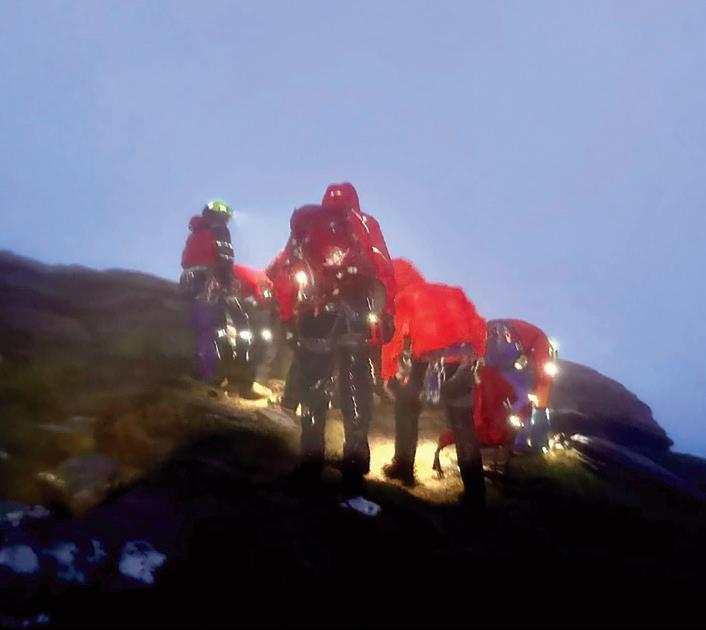
In July, the Scottish Cave Rescue Organisation (SCRO) rescued a caver who had been trapped for over five hours in a cave near Applecross, Wester Ross. The caver, part of an experienced group, became wedged in a narrow crack. The volunteers worked successfully to free the caver, who emerged cold but unharmed.
Hebrides MRT were called out on Friday 16th August for two walkers who had become disoriented and lost in deteriorating weather conditions, on Eabhal, North Uist. The walkers were located around 9pm, after being out in poor weather conditions for nearly 12hrs. The walkers were assessed and given dry, warm clothes and some food. They were then airlifted to the road side.
20 Mountain Rescue volunteers from across Scotland successfully passed their Remote Rescue Medical Technician assessment this month.
Tweed Valley Mountain Rescue Team had a busy October, as many of our Mountain Rescue Teams did! Their volunteers logged a combined total of 398 hours attending 13 incidents in October - their busiest month on record.
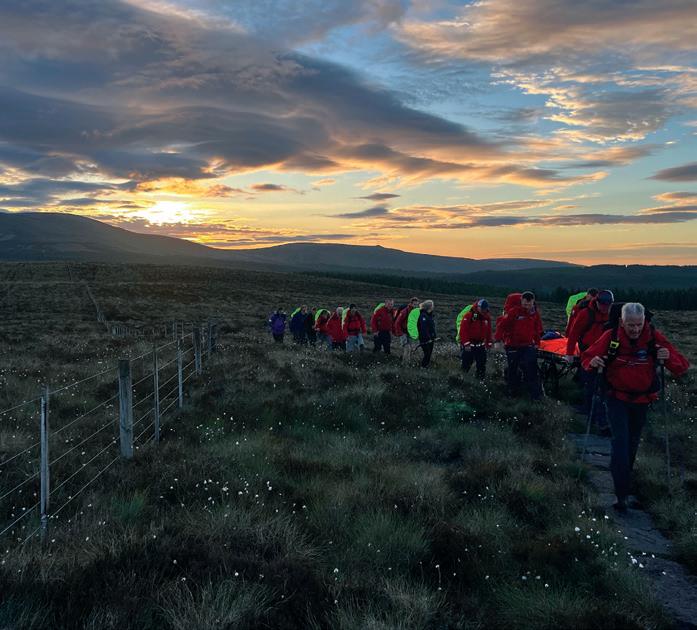
Scottish Mountain Rescue ran its first ever Hill Fundamentals course in November. Aimed at team members who have recently joined a Mountain Rescue Team, the 3-day course was designed to give a greater understanding of some of the fundamental skills and ethos needed to safely help those who get into trouble in the hills.
Storm Darragh didn’t prevent the scheduled weekend training for Assynt Mountain Rescue Team. The team gathered in Tongue on the north coast to train, with a focus on volunteer resilience and wellbeing.

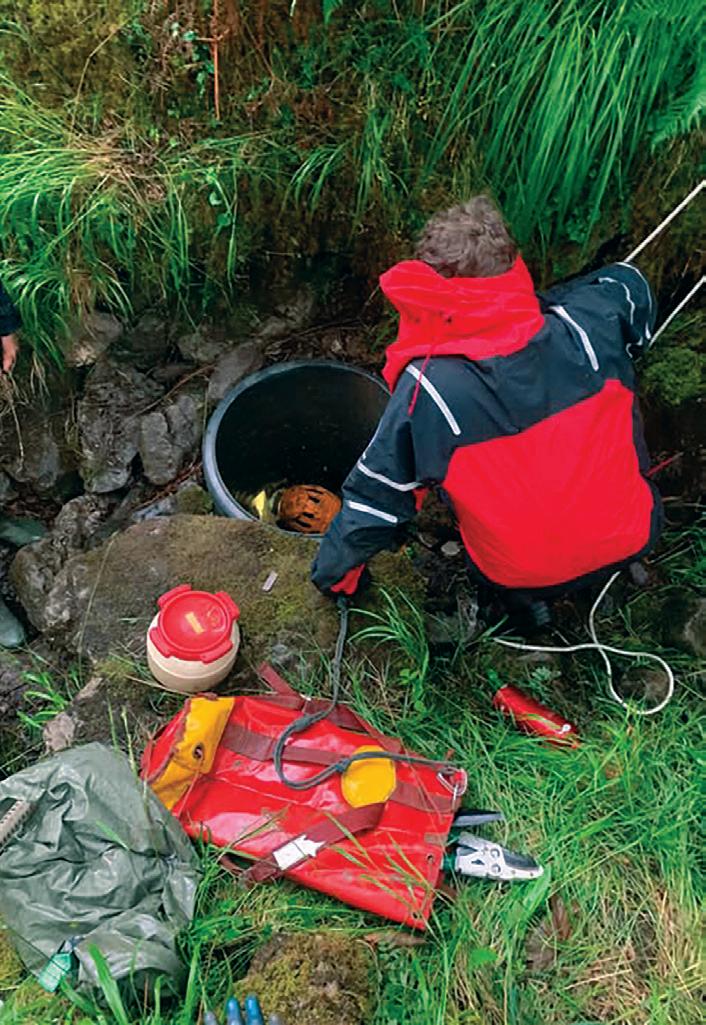

I set off in good weather on 9th December 2024 planning to traverse Beinn Alligin with a camp part way, but I became suddenly unwell on my ascent to Beinn Alligin.
I was feeling dizzy and unable to continue walking, so with sunset approaching I made an emergency camp. My plan was to try to make it through the night and descend the next day. Feeling very weak I tried to set up my tent but the slope I was on, was too steep so it was very precariously pitched. I couldn’t lie on my mat because it was sliding into the tent wall and threatening to destabilise my tent so I made a kind of hole in the snow in the middle of the tent but after 45 minutes I started to get shivery and very cold.
“I was losing my temperature from the ground and being so unwell wasn’t helping. I considered descending in the dark but it was too dangerous.”
I’ve been on cancer treatment for two years but I’ve been doing well and have got back to doing physically demanding outdoor activities again, so I didn’t expect to find myself suddenly unwell like this. It’s never happened before. With 12 hours of night ahead of me I made the hardest decision to call 999. I consider myself an experienced hiker and I’ve never felt so much anxiety as I did making that call.
I
felt ashamed and scared to call for help, but the experience gave me new perspective.
“Since the first moment I spoke to Torridon Mountain Rescue Team they were reassuring. Tom was telling me about every step and guiding me about what to do which kept me much calmer.”
They managed to call for assistance from HM Coastguard helicopter to avoid having to make an icy descent in my condition.
I weirdly don’t remember much from the moment when MRT arrived at my tent. It was very emotional and stressful for me, despite nothing serious having happened. All I remember was a feeling of gratitude for the volunteers and their beautiful souls and existence.
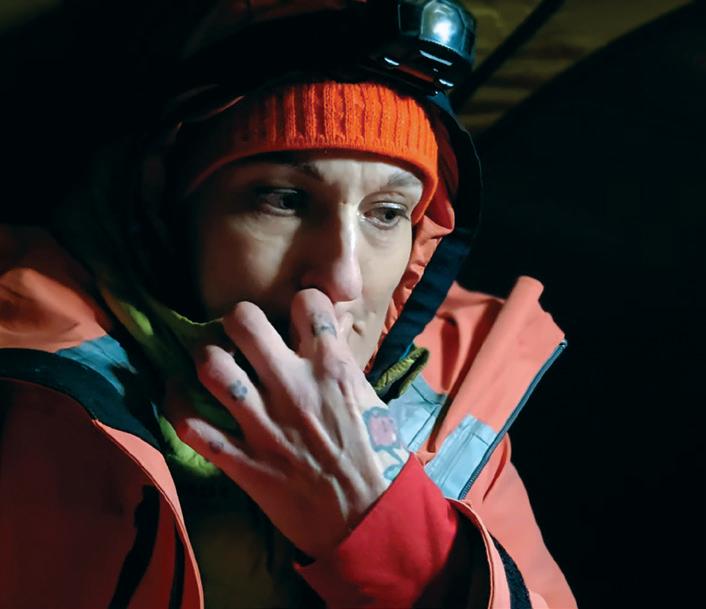
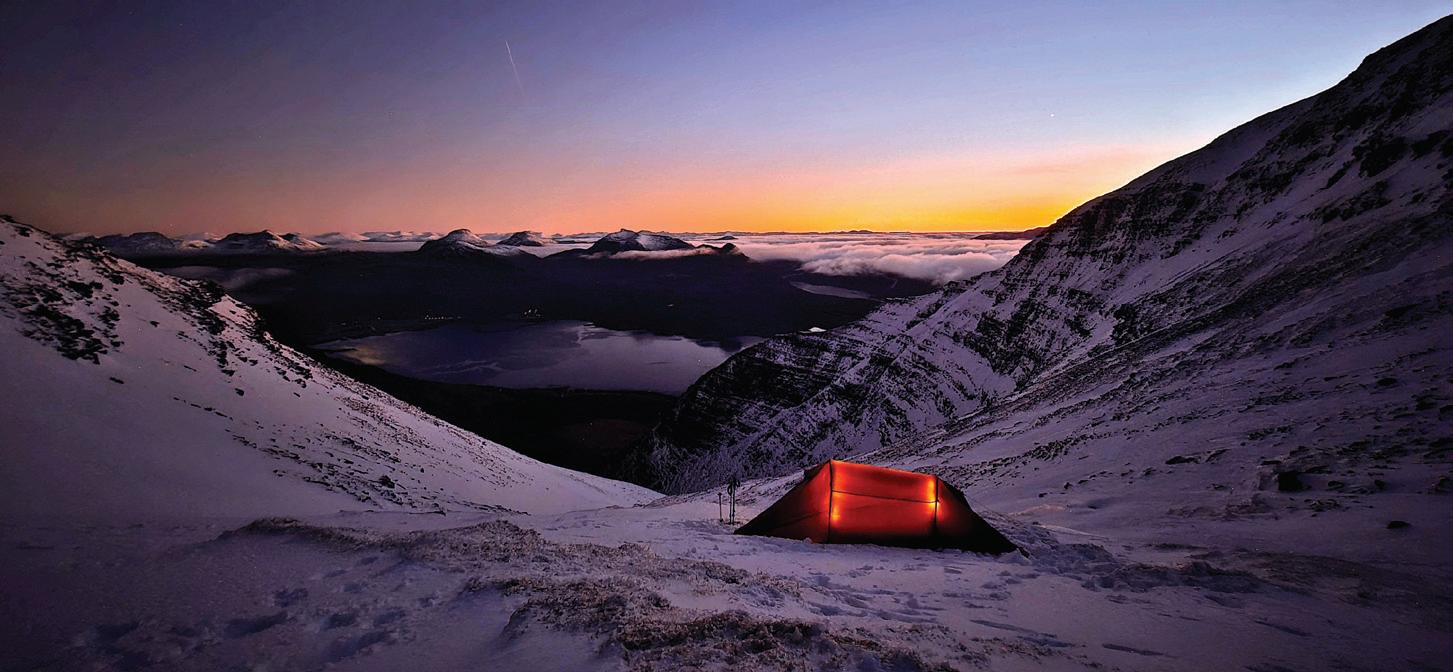
I remember how they put rope around my waist, put my crampons on and guided me up to the summit where there was a waiting helicopter. I was supported by Doug by my side and pulled up by Alex. I have honestly never felt so weak in my life and without them I wouldn’t have made it.
My story didn’t end there. I was dropped at Stornoway hospital where an amazing nurse team gave me food, checked on me and next day helped me to get the ferry to the mainland. My debit card stayed in my backpack which MRT packed for me and took off the hill, after I had been taken by helicopter. At Ullapool Police station, a lady helped me to get on bus to Garve, where Tom was so kind and was waiting with my backpack. He then gave me a lift to Shieldaig hotel.

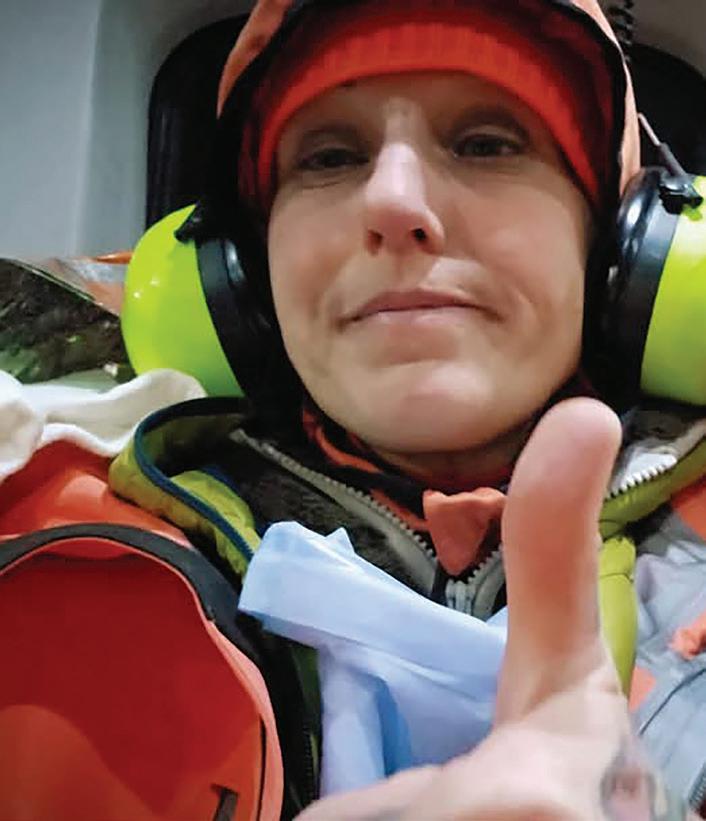
“The people involved in helping me showed an enormous amount of empathy, kindness and understanding. So many amazing people, that now I have much more hope and love for humanity. It opened my eyes to fact that all MRT are volunteers and amazed me with what beautiful souls you are.”
I set up a direct debit for MRT straight away and from now on my every UK adventure will be fundraising for Mountain Rescue Teams, and profits from prints from artwork I sell, will go towards Mountain Rescue Teams in Scotland. I also donated some of my artwork to Torridon MRT for their base as a thank you.
Thank you is not enough to say for my saving life, I feel so much gratitude that I can’t express with words.

Image © Dundonnell MRT
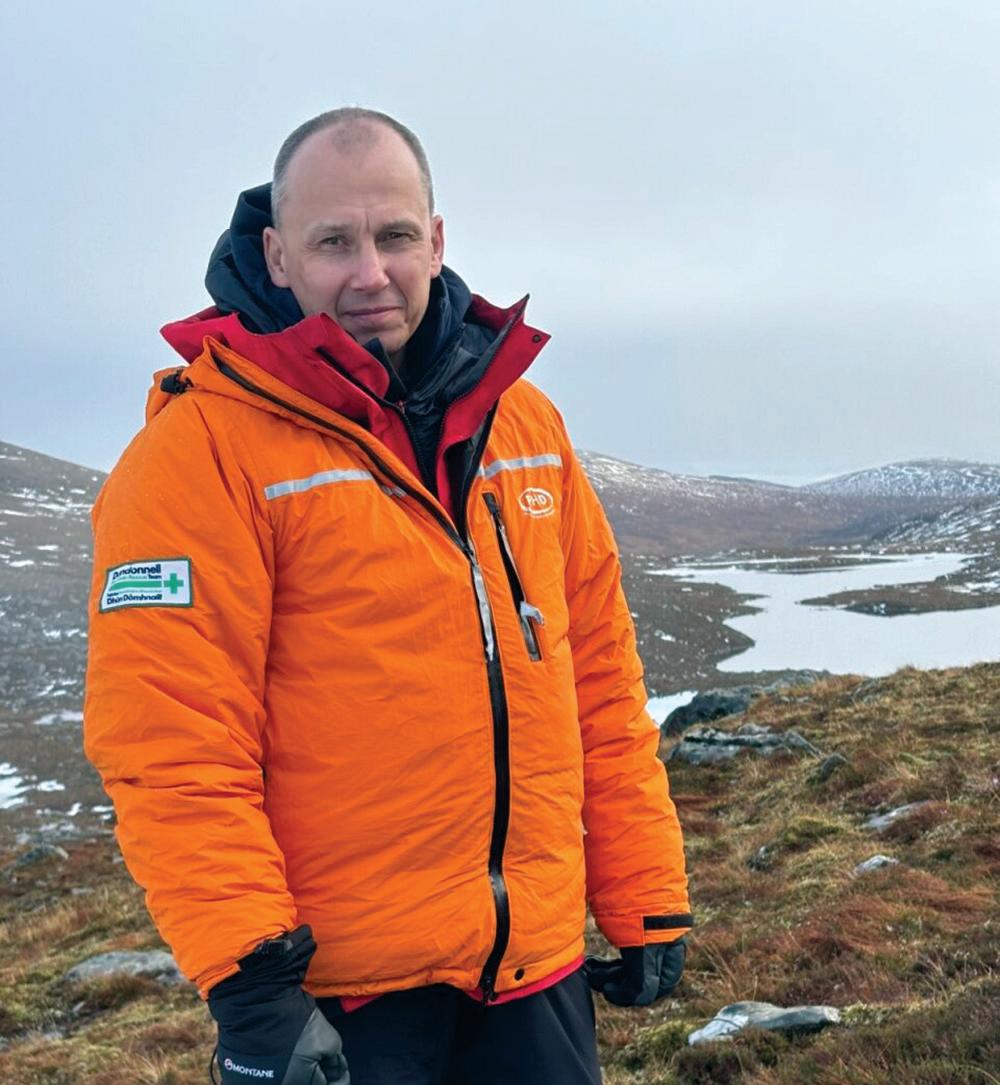
Mike Brown
Dundonnell MRT
I’ve been based in and around the Northern Highlands most of my life, and have enjoyed being out and about in the Scottish hills for many years. I work full time in a busy management role within financial services. My employer is very supportive of my involvement, both by way of time off to attend call outs, and also through a regular financial donation.
I joined Dundonnell MRT in 1985, aged 16 along with several others as the service part of our DofE Gold award. We all had a keen interest in the outdoors and were based on the East Coast (Dingwall). For most of the time since, I’ve remained involved, happy to do my bit as an ordinary team member, whether that be lugging a piece of gear up the hill, being part of a line search, helping set up a belay and generally assisting in any way I can along with a brilliant group of people.
“I was warmly welcomed as an enthusiastic but
inexperienced
youngster, and
given the opportunity to spend a year attending training exercises every month covering all the usual disciplines.
In those days the team was smaller in numbers, being predominantly spread across the West Coast between Gairloch and Ullapool, with only a couple of members based on the East. My newly gained skills acquired through that year of training with the team, were quickly put to use on the many call-outs across the area. The team recognized the part that could be played in both expanding its presence on the East Coast and bringing through other young people, which it has done very successfully since.
It is rewarding helping the team towards a successful outcome on a call out. I also find the camaraderie and friendships built up over many years enriching. The gear we use is regularly changing and improving, meaning learning is a constant.
“The quality of people involved in MR throughout my time has always been incredible, there is never an outing with the team in which I don’t come away having learnt something new.”
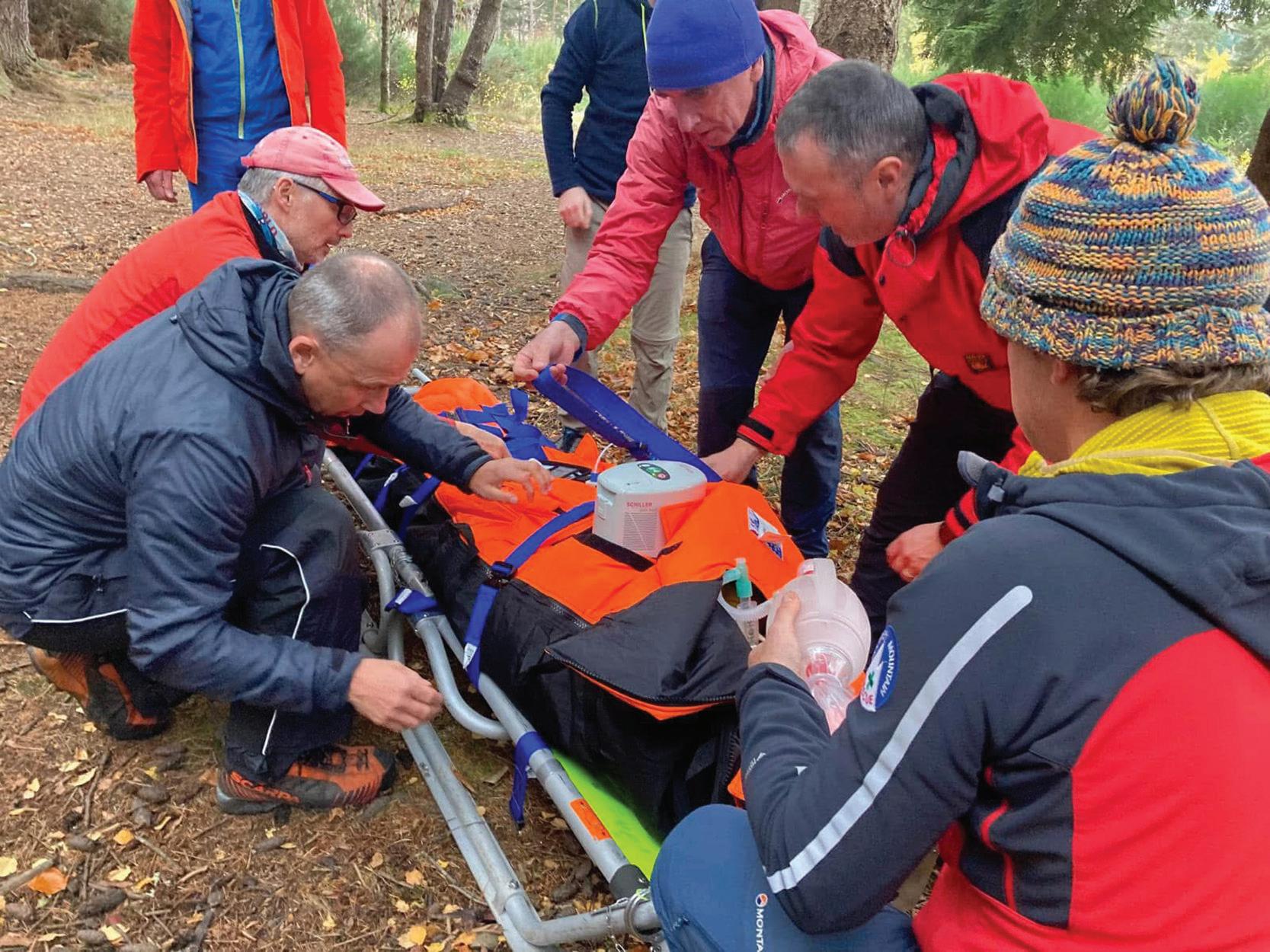
It can be challenging trying to balance various other demands on time, including raising a young family, a busy and demanding work environment, and trying to maintain other interests and hobbies. Our patch is quite extensive, so travel can be substantial, with round trips of 120-150 miles not unusual to attend training and call outs in remote areas.
“You need to be resilient as a team member and this takes both physical and mental forms. Physical in terms of trying to maintain a reasonable level of fitness for those long days and nights out on the hill, and mental such as dealing with challenging outcomes which can confront any team member from time to time.”

There are various situations over the years that have required a great deal of resilience. In particular, losing two of our own highly regarded and extremely experienced team members, Alex Brett and James Edwards, in tragic accidents on our local hills in under a year of each other over 2015/16 were very challenging. I was involved in both rescues as part of our wider team over multiple days and they are never far from my thoughts.

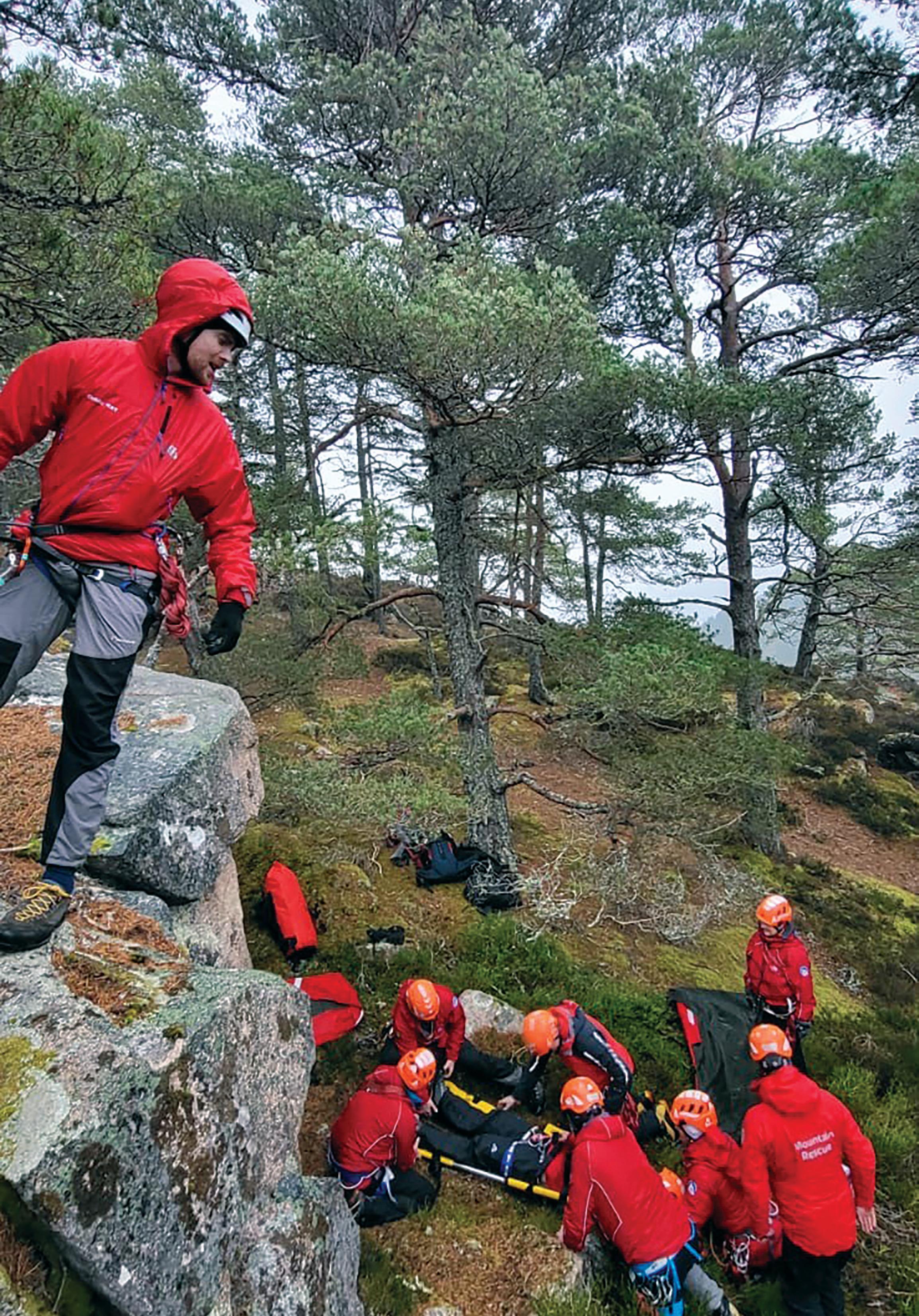

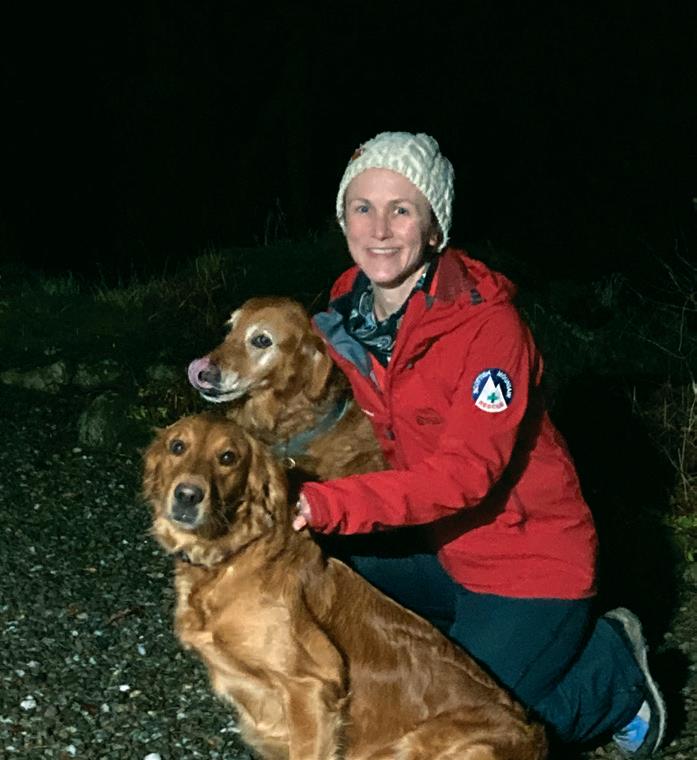
Lizzy Thomson Ochils MRT
I’m a member of Ochils MR and just in my first year of being on the callout list having completed my training year last June. So - fair to say - I’m still in the newest of the newbies. I’ve got a medical background (I’m a vet working in clinical practice for 20 years) so the medical side of things has been more familiar to me than the rigging. In recent years I’ve had voluntary roles as a mountain bike leader and a ski patroller so when a friend and fellow team member suggested I apply to the team it seemed to tick all the boxes of things I enjoy doing.
“I’ve
loved the exposure to learning different skills
that
being in the team brings - I’d never have met a ‘maestro’ or a ‘three to one’ raise in my previous life.”
The team are fantastic - they’ve been super supportive and a fun bunch of people to spend time with up hills in all weather.
“I think having a mix of ages, careers and sexes in the team gives it hybrid strength as everyone will have slightly different experiences and resilience. I also think it helps to more accurately reflect the demographic of people we are called on to help which is, of course, diverse.”
I have two living children, aged 7 and 9 and work a little under full time so my juggling is just the same as all other working parents. As well as his normal day job my husband is in the military reserves, so we have always juggled family life between us and mostly we keep the balls in the air.
Generally, though I think resilience is about having coping mechanisms to get you through both the big things and all the little stressors of life. For me, my tonics are hills, dogs, exercise and remembering that it’s always likely someone close to you is having a worse time than you are. Depending on which hat I’m wearing as mum, vet, friend or MR team member it’s a privilege to be able to help in some way.
We aim to support a culture where all volunteers (and staff) enjoy a positive and rewarding experience throughout their journey from recruitment to leaving or “retirement”. This applies to whatever role(s) we play throughout the broad spectrum of providing a worldclass mountain rescue service. We recognise that the risks associated with psychological injury arise from both operational and organisational stressors. The organisational stressors are linked to the general challenges of being a volunteer responder, and together with the pressures of managing teams and the national organisation (all charities) these stressors can often be greater than the risks from operational trauma exposure.
The World Health Organisation (WHO) Glossary (2021) describes wellbeing as a positive state experienced by individuals encompassing quality of life and the ability to contribute with a sense of meaning and purpose. Wellbeing can be observed by the extent to which people are resilient, build capacity for action, and are prepared to transcend challenges. They note that resilient individuals have the problem-solving skills, social competence and sense of purpose to rebound from setbacks, thrive in the face of poor circumstances, and generally continue to lead productive lives. Resilience is shaped by the availability of supportive environments. (You can find the full descriptions in the glossary)
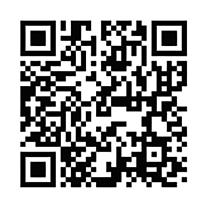
We continue to make progress in how we embed an understanding of personal wellbeing and resilience; how to support colleagues; and what to do following incident trauma exposure, into our complete (recruitment to retirement) volunteer experience. We believe in a preventative and early intervention approach rather than reactive post-event approach to volunteer wellbeing and resilience. This year we have increased the number of our volunteers now in a position to facilitate the Lifelines learning modules as part of the Lifelines Facilitator programme.
How we manage the risks of psychological injury, and any recovery journey, involves a number of key partners as well as every volunteer, member of staff, colleague and our personal social networks. Our key partners are Police Scotland and the Rivers Centre (NHS Lothian). All our volunteers and their families have access to the Police Scotland “Employee Assistance Programme” (EAP) which offers a wide range of services. Since September 2024, we also now have an agreement in place for post trauma support from the NHS facility, The Rivers Centre. The staff there have many years of experience in working with emergency service staff and volunteers (Scottish Fire and Rescue Service and Police Scotland). The Rivers Centre team also created the Lifelines resource and the training that forms part of their overall ethos of taking a public health approach to how we manage the risks of psychological injury. You can find details of all of our approach in the
SMR toolkit: Managing the Risks of Psychological Injury using this QR code:


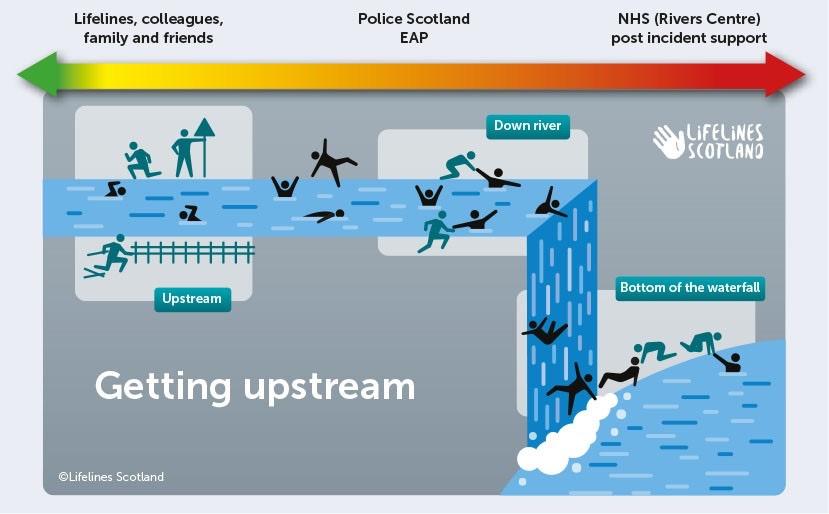
The Lifelines Scotland Modelimagine a river and waterfall
We want to get upstream, and our focus is on prevention and early intervention, giving people the knowledge and skills to look after themselves and their colleagues.
As well as helping people when they’re in the river, or over the waterfall, we want to teach people to swim, build rafts & put up fences at the risky parts of the riverbank.
Tools for regular use:
N Capacity Self-check tool
N Post incident Self-check tool


“….I should say that I am not someone who usually embraces the opportunity to discuss these sort of things, especially with strangers. However, the Rivers Centre did contact me and, without any pressure, engaged me in a useful conversation that was both supportive and helpful. I guess I’d like to stress that, despite the hard work that has gone into discussing wellbeing, there are still some of us who think we don’t need to talk, don’t need to ask for help and do not need resources and services like Lifelines or the Rivers Centre. Based on my experience I would recommend engaging with Rivers, it was a really positive experience and I would do it again.”

Volunteer, who accessed the River Centre
There are two types of mountain rescuer – the ones who have opinions about gear and the ones who have strong opinions about gear!!
In over 30 years as a mountain rescuer our equipment has been transformed from very little to a full range of modern purpose designed clothing and equipment. I can remember that when I joined my team, we had 8 radios and 12 jackets so you had to make it to the post quickly to stand any chance of using the team gear!!
We have all been out in horrendous weather – when most sensible folks are either not on the hills or are making best speed back to the pub, many mountain rescue teams are mobilising to go on the hill and operating in the most difficult conditions.
In the 70s and 80s most team members used their own equipment and, of course, this was trashed on numerous occasions. Some teams were able to provide a small ‘equipment allowance’. This was a good start
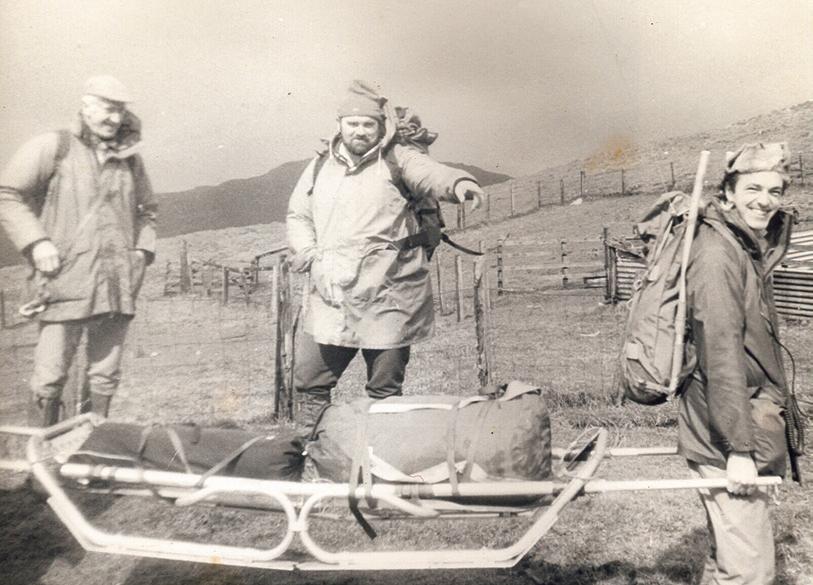
but as teams became increasingly busy the requirement for effective and appropriate equipment for team members became more vital – and there was always one team member who turned up without a jacket!
The 90s started to see the advent of teams providing limited team issue gear and some folks will remember when it looked like most teams were sponsored by Buffalo although they had to be blue! (Very good jackets and discounts were provided to teams!) This was followed by Slioch who made excellent (if heavy) jackets for many teams.
Most teams have had equipment officers who mainly looked after team equipment, ropes, slings, cas bags etc. As the 90s progressed equipment started to become routinely recorded and inspected.
There has been steady progress over the years and most teams now provide team members with base layers, softshells, outer shell jackets, belay jackets, helmet, harness and Personal Protective Equipment (PPE), personal radios, avalanche transceivers, ice axes, head torches, rucksacks, socks and boots either by providing team issued kit or by way of an allowance. The significant




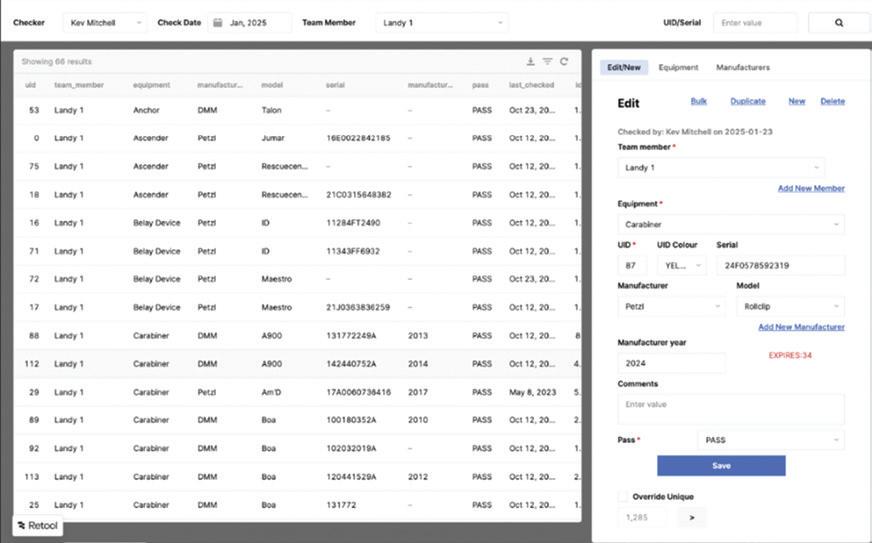
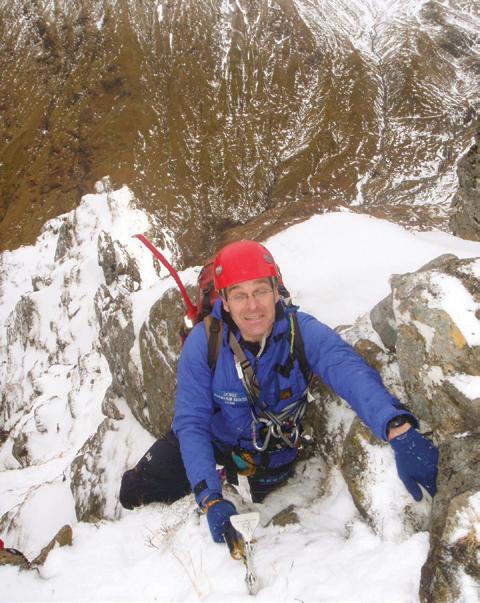

can’t extend this to all team members, sometimes for example probationary team members might need to bring their own kit or some teams might not be able to replace items very often.

Volunteers are often heading out in the most challenging conditions and we need to ensure that they have the right kit to keep themselves and the casualties safe during rescues. However, this does come at significant cost and also a comprehensive and recordable inspection regime. Many teams use proprietary equipment management software, or have developed their own to keep track of and replace defective team PPE. This is normally checked centrally and tagged as in date.
So given that teams generally have between 30 and 40 team members, what is the cost implication in 2025, of kitting out a team? I have used my own team and been conservative in my estimates as most teams get discounts. We have a dedicated volunteer at Scottish Mountain Rescue who has generated numerous discounted deals with most major suppliers and some teams have relationships with a particular brand.
Where we are now? – Yes it’s the money shot …how much to kit out a typical team member… Wait for it approximately… £3050.00 so if you multiply this by say 35 team members that makes personal equipment a whopping £106,470 per team, and this kit won’t last forever and will need to be replaced every few years as it gets a lot of heavy use.
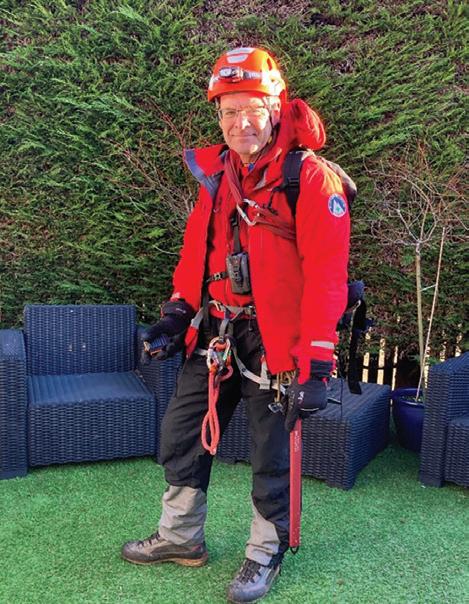

It is critical for our safety that team members have the best equipment for the conditions we operate in. Alongside personal equipment for team members, all of our rescue equipment helps us to give casualties the best possible chance of a good outcome.
As volunteers we give our time for free. Volunteers in many teams also contribute to the running costs, through paying their own petrol to attend callouts and training, phone and IT costs for communicating with the team, bringing their own snacks and food to sustain them during training and call-outs and sometimes contributing their own kit too. Every rescue costs on average £2,500 but we estimate that team members contribute £500 of their own funds to make each rescue possible.
We are also incredibly grateful to all our supporters who fund the majority of our rescue costs, you help keep us running. Your donations, fundraising and gifts in wills keep us safe in the worst of conditions.
Kev Mitchell Incident manager Ochils MRT
Thanks to Bob Sharp Archive
Anthony Luxton Equipment Officer Ochils MRT



Everyone that supports Scottish Mountain Rescue and our member teams is a life saver. Whether you donate, fundraise or have left a gift in your will. You help our teams to be there when the call-out comes in.
With teams facing increased call-outs in recent years, and having to stretch their resources further, this support is appreciated now more than ever.
We hope you know what a difference you make to Scottish Mountain Rescue and our member teams. Thank you for everything you do.
“The most memorable events have been the call-outs where we have really made a big difference and have actually saved a life through the use of the training we have received”
Donald Lomond Mountain Rescue Team
We also wanted to say a special thank you to the family and friends of our volunteers who sacrifice so much to support our volunteers who often miss family occasions to drop everything to go to the aid of a stranger.
Together we can provide peace of mind for everyone who wants to enjoy our beautiful mountains. Our 26 Mountain Rescue Teams provide a vital free service for everyone who enjoys spending time in the outdoors in Scotland. But our rescues wouldn’t be possible without the support of our mountain loving community. We are all one team of lifesavers.
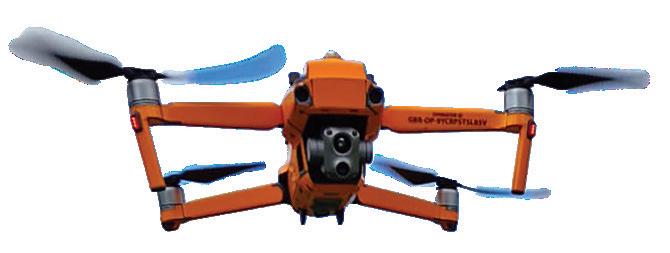
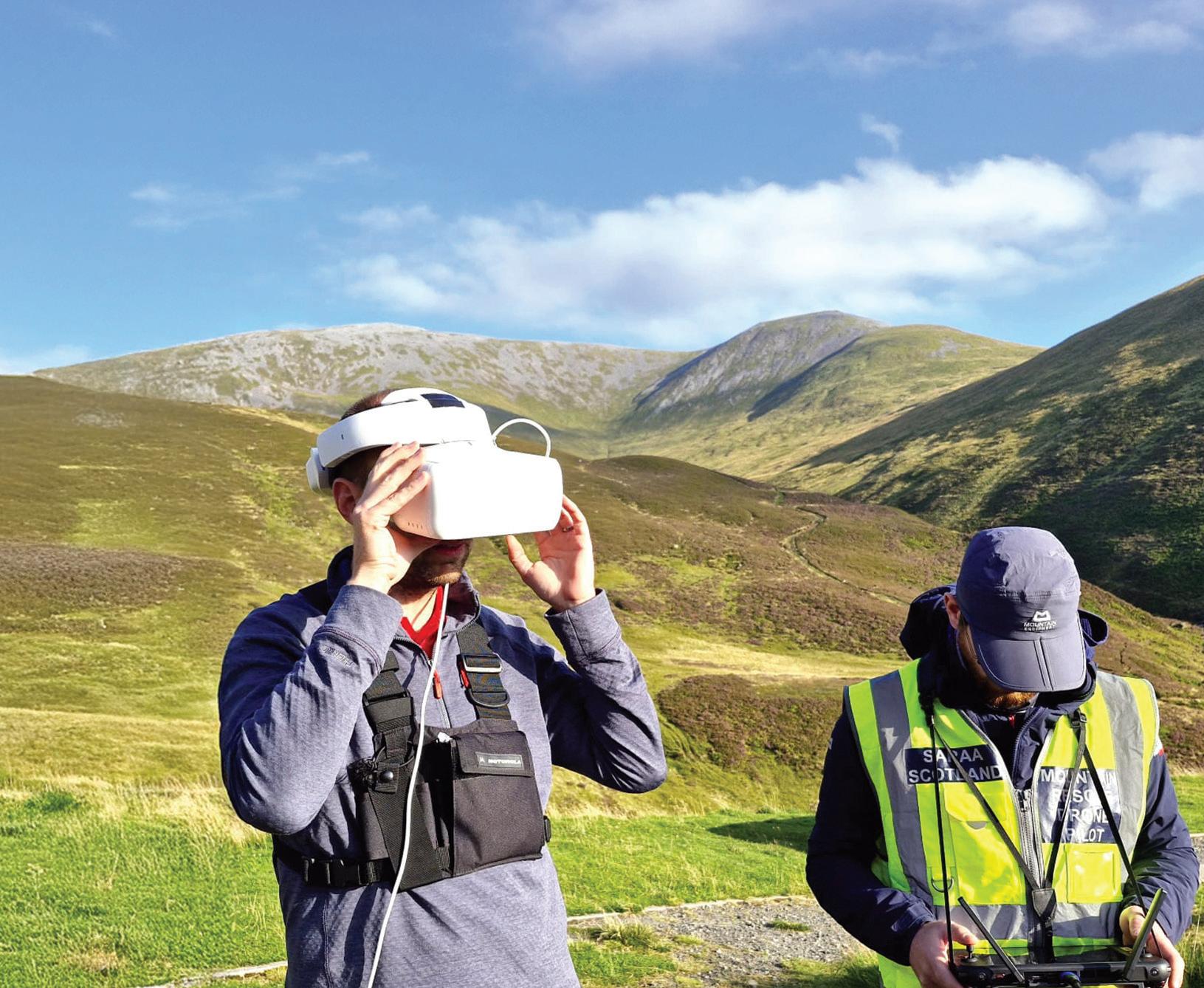


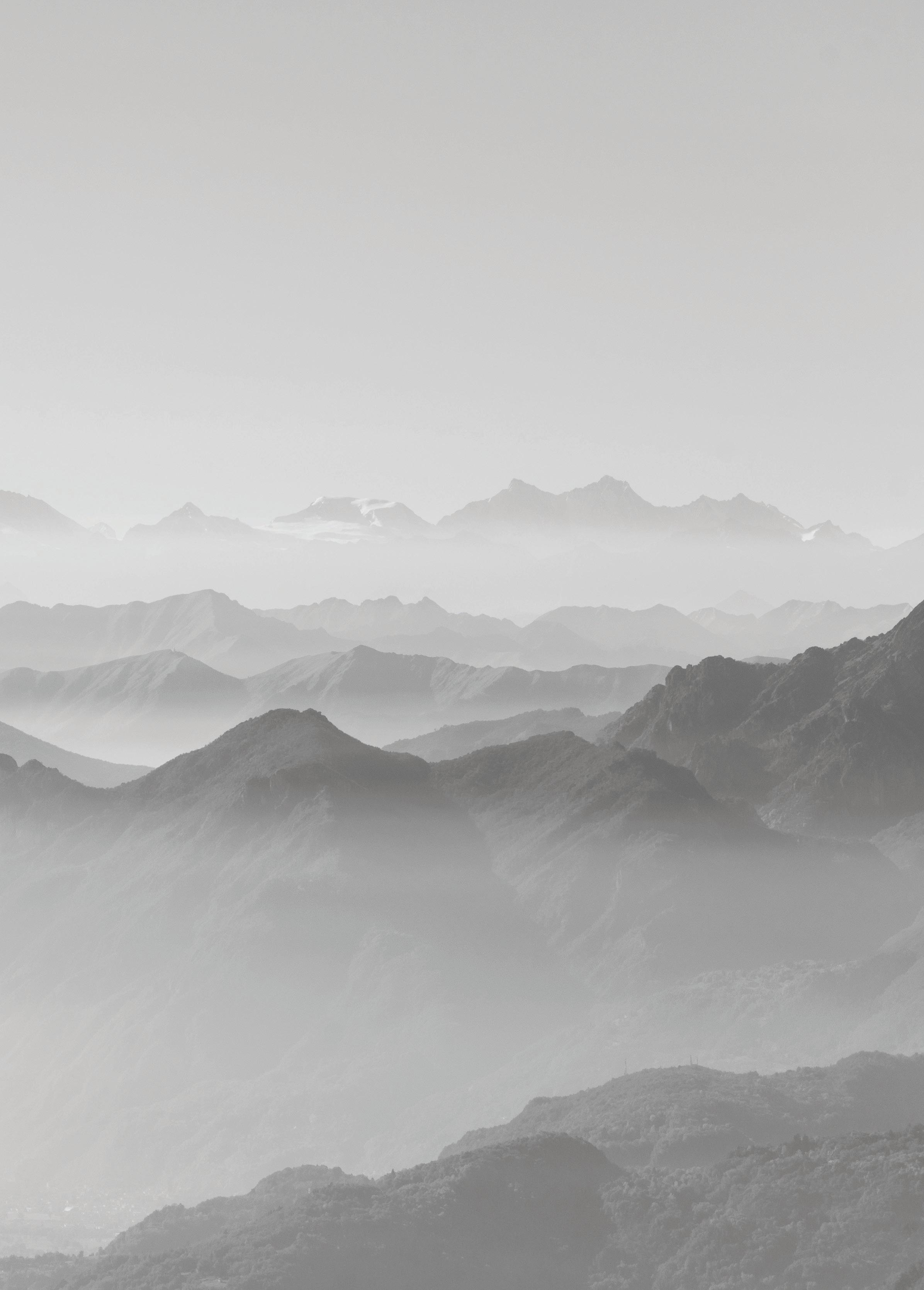

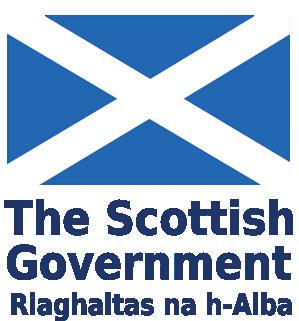
We want to express our gratitude to the Scottish Government for their continued support of Scottish Mountain Rescue.
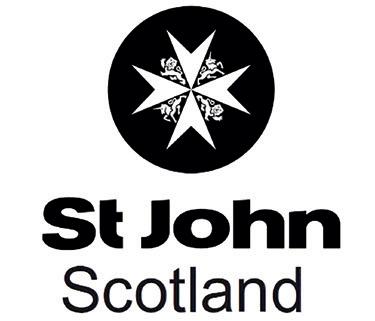
St John Scotland (SJS) have been a long-standing supporter of MRTs in Scotland. They have generously given over £3.75 million in funding, mainly through the provision of bases and vehicles, but also made a significant contribution towards the purchase of new radios in 2019, helping MRTs to save lives.
We would like to say a big thank you for the continued support of St John Scotland. In return our teams are increasingly assisting St John Scotland with its work in taking public access defibrillators and CPR training to their communities, and we look forward to finding ways to continue to work together and support each other in future.
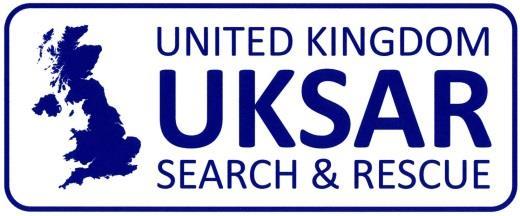
Finally we would like to thank the UKSAR Training Fund administered by the Charities Aid Foundation for supporting the national training programme offered by SMR.
STRATEGIC
SEARCH


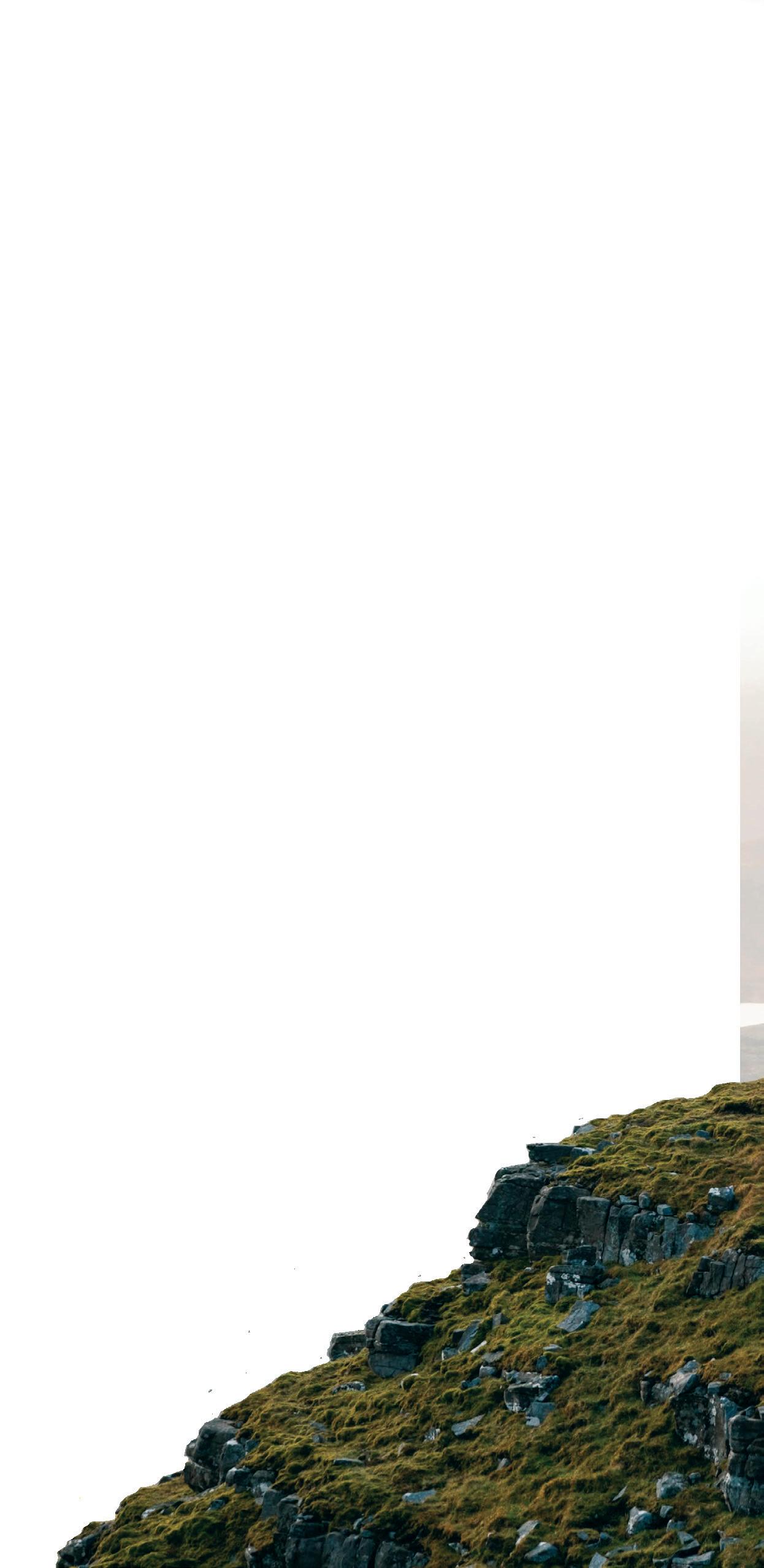
JANUARY 2017
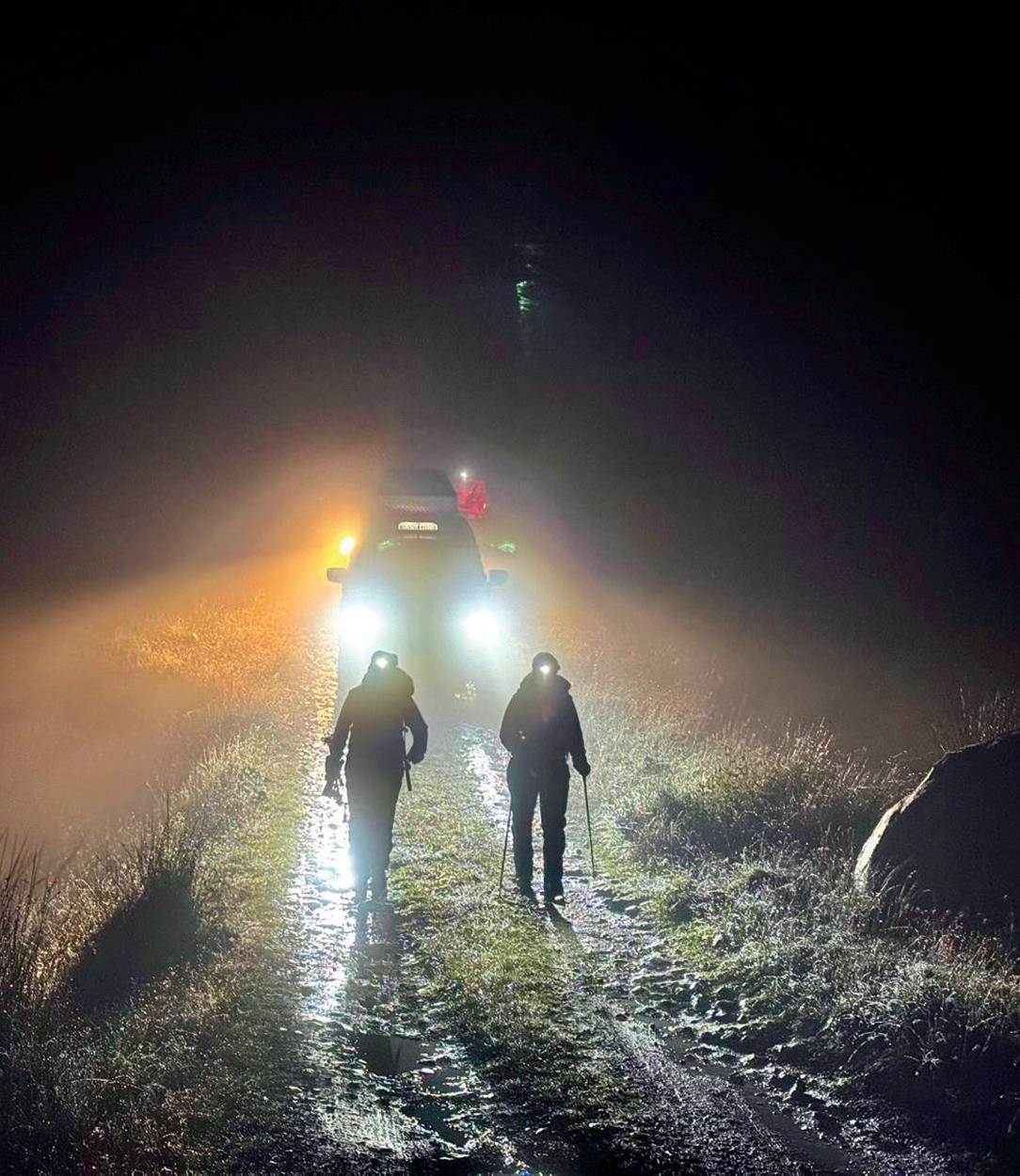

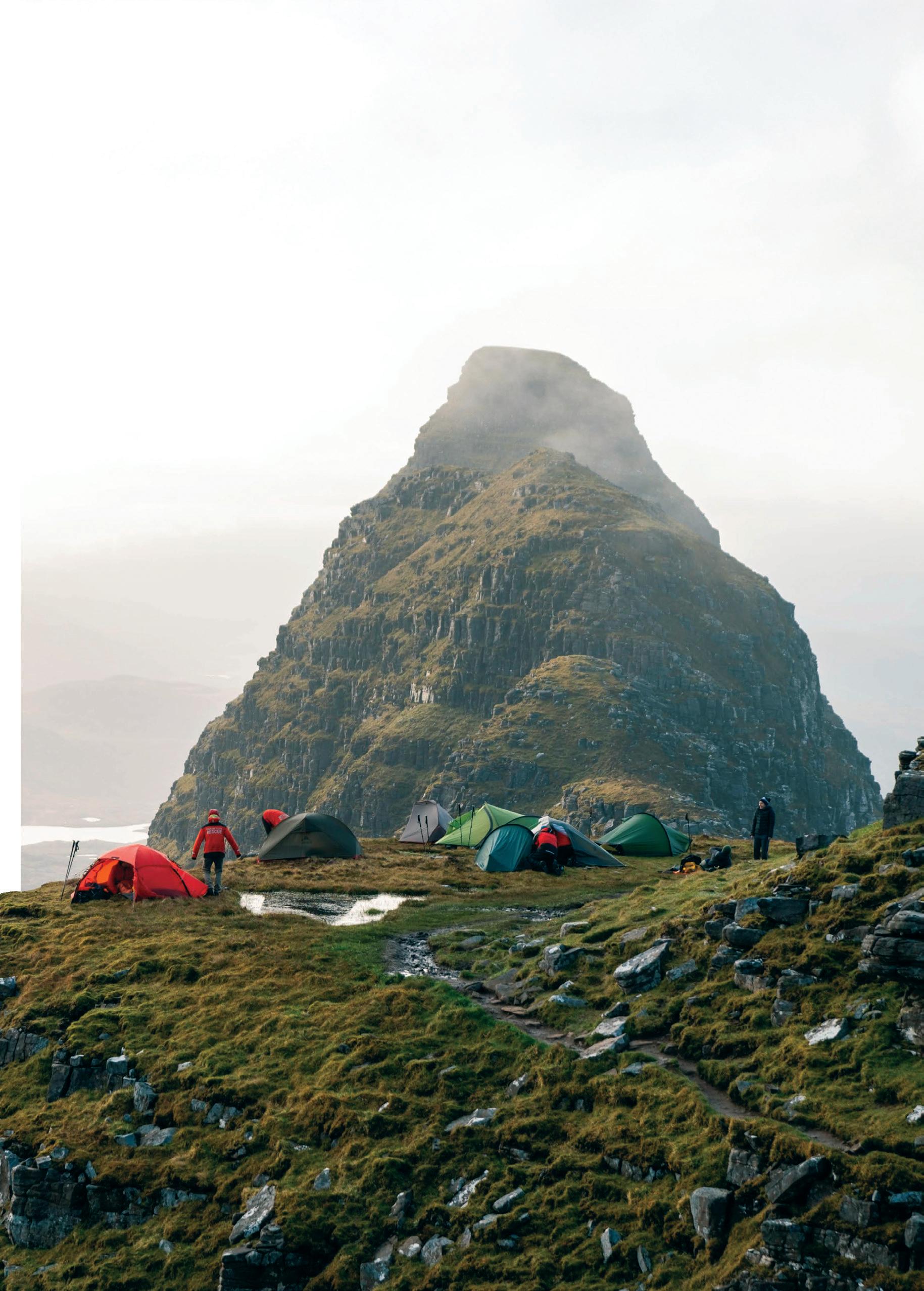
There are lots of different ways you can support SMR or your local MRT including:
• Make a one-off donation
• Set up a regular donation
• Volunteer your time
• Leave a gift in your will
• Fundraise
We’re a vital free service for anyone who uses the outdoors in Scotland but we rely on donations to fund three out of every five rescues, so our work simply wouldn’t be possible without you. Gifts in wills are an increasingly important way to support us, funding around 100 rescues every year!
www.scottishmountainrescue.org/support fundraising@scottishmountainrescue.org 07846 653000


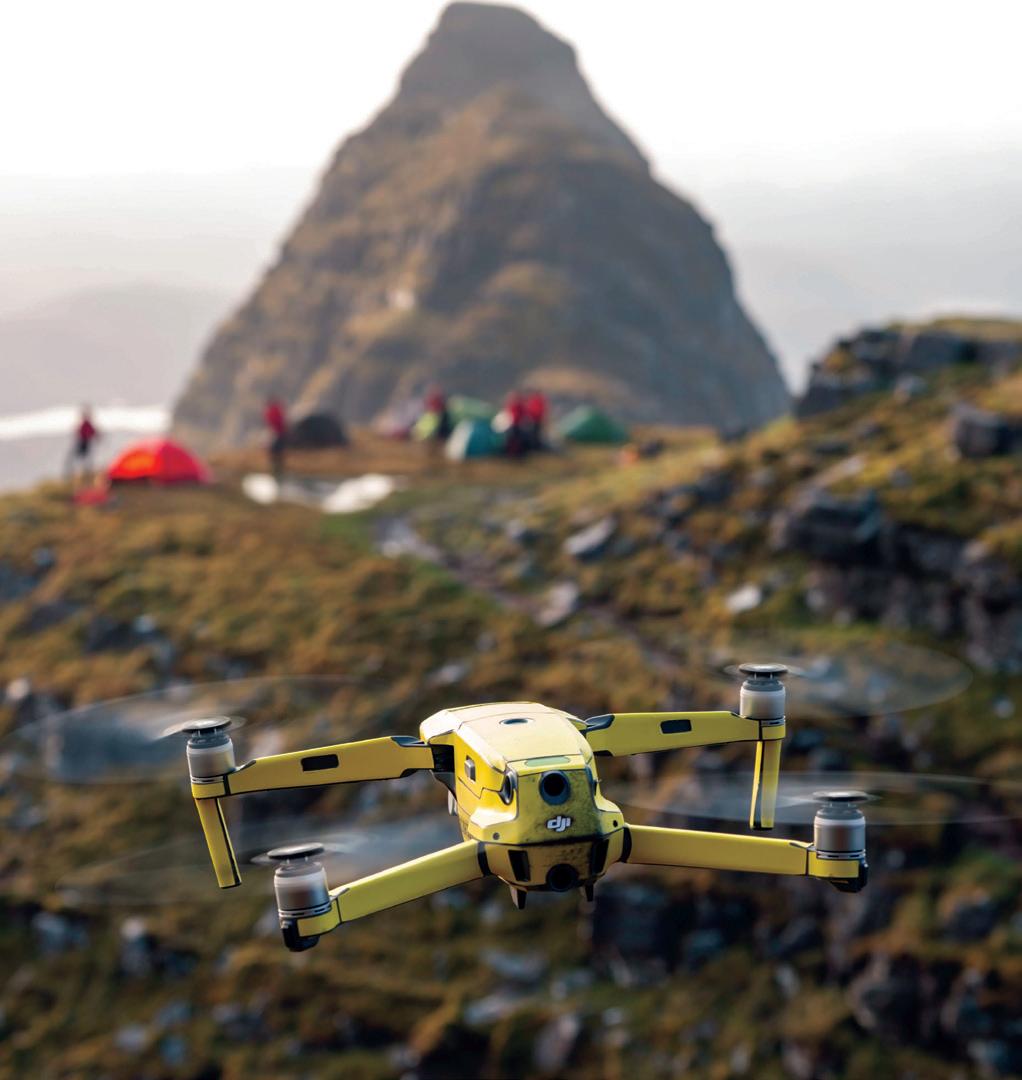
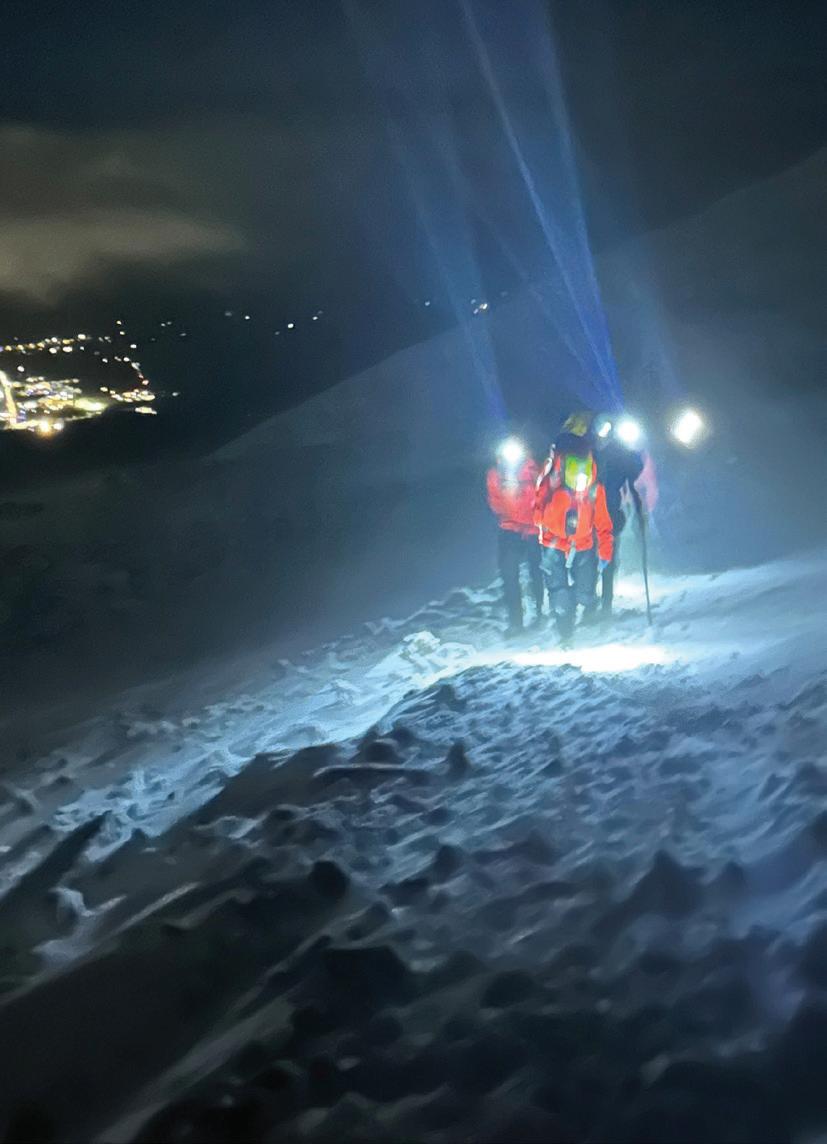
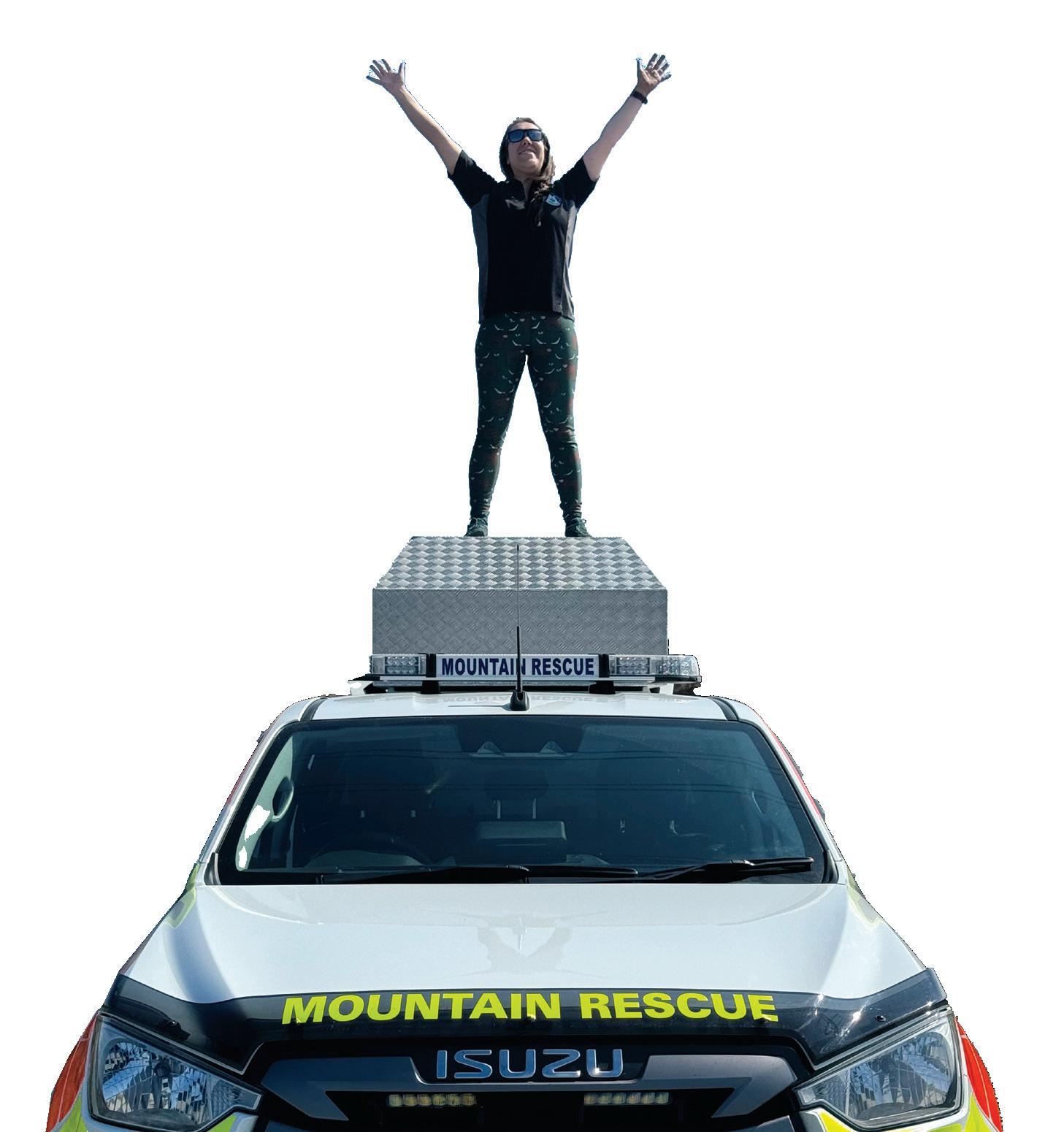
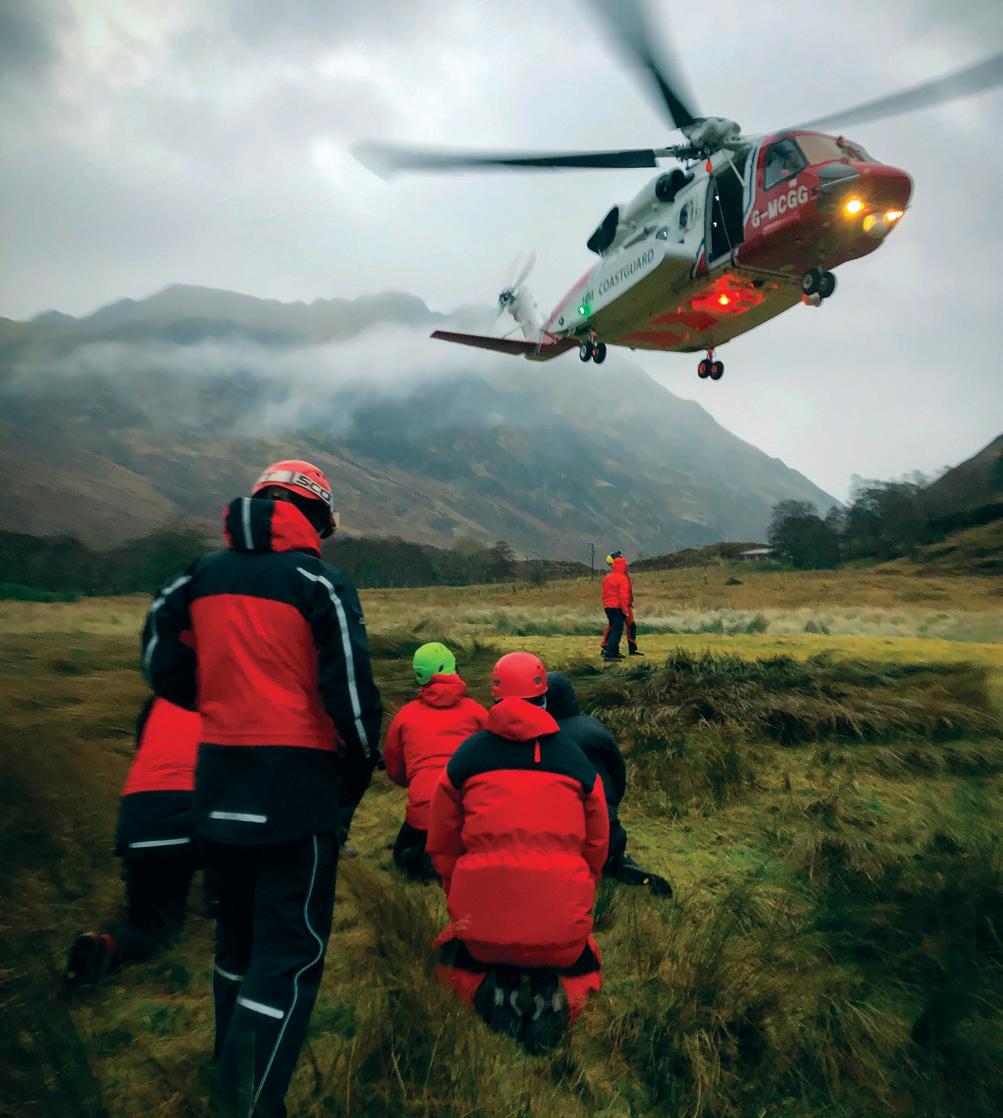

SMR represents these teams and their contact information can be found on scottishmountainrescue.org
Aberdeen MRT
Arran MRT
Arrochar MRT
Assynt MRT
Borders Search and Rescue Unit
Braemar MRT
Dundonnell MRT
Galloway MRT
Glenelg MRT
Glenmore Lodge MRT
Hebrides MRT
Killin MRT
Kintail MRT
Lochaber MRT
Lomond MRT
Moffat MRT
Oban MRT
Ochils MRT
SARDA (Scotland)
SARDA (Southern Scotland)
Search & Rescue Aerial Association
Scotland
Scottish Cave Rescue Organisation
Skye MRT
Tayside MRT
Torridon MRT
Tweed Valley MRT
Police Scotland (Grampian) MRT
Police Scotland (Strathclyde) MRT
Police Scotland (Tayside) MRT
Police Scotland (Highland) MRT
RAF Lossiemouth MRT
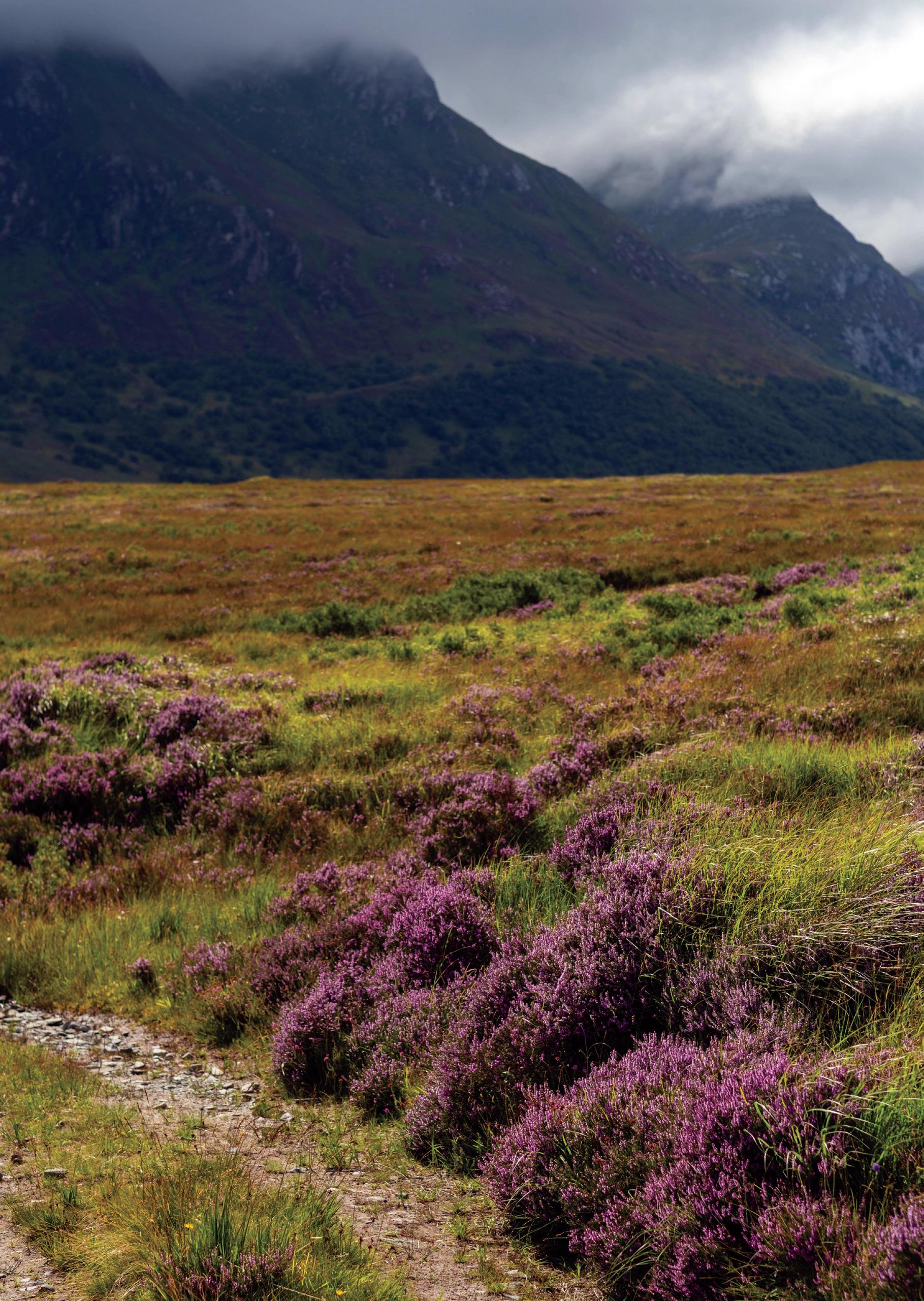
SMR works in partnership with –
The Scottish Government
Police Scotland
Scottish Ambulance Service
Scottish Fire and Rescue Service
Bristow Helicopters Limited
Maritime and Coastguard Agency
The Home Office
Scottish Charity Air Ambulance
Scottish Mountain Rescue
Glenmore Lodge
Glenmore
Aviemore
Inverness-shire
PH22 1QZ
info@scottishmountainrescue.org
01479 861 370
www.scottishmountainrescue.org
@scottishmountainrescue
@ScottishMR
@scottishmountainrescue
Volunteering to save lives